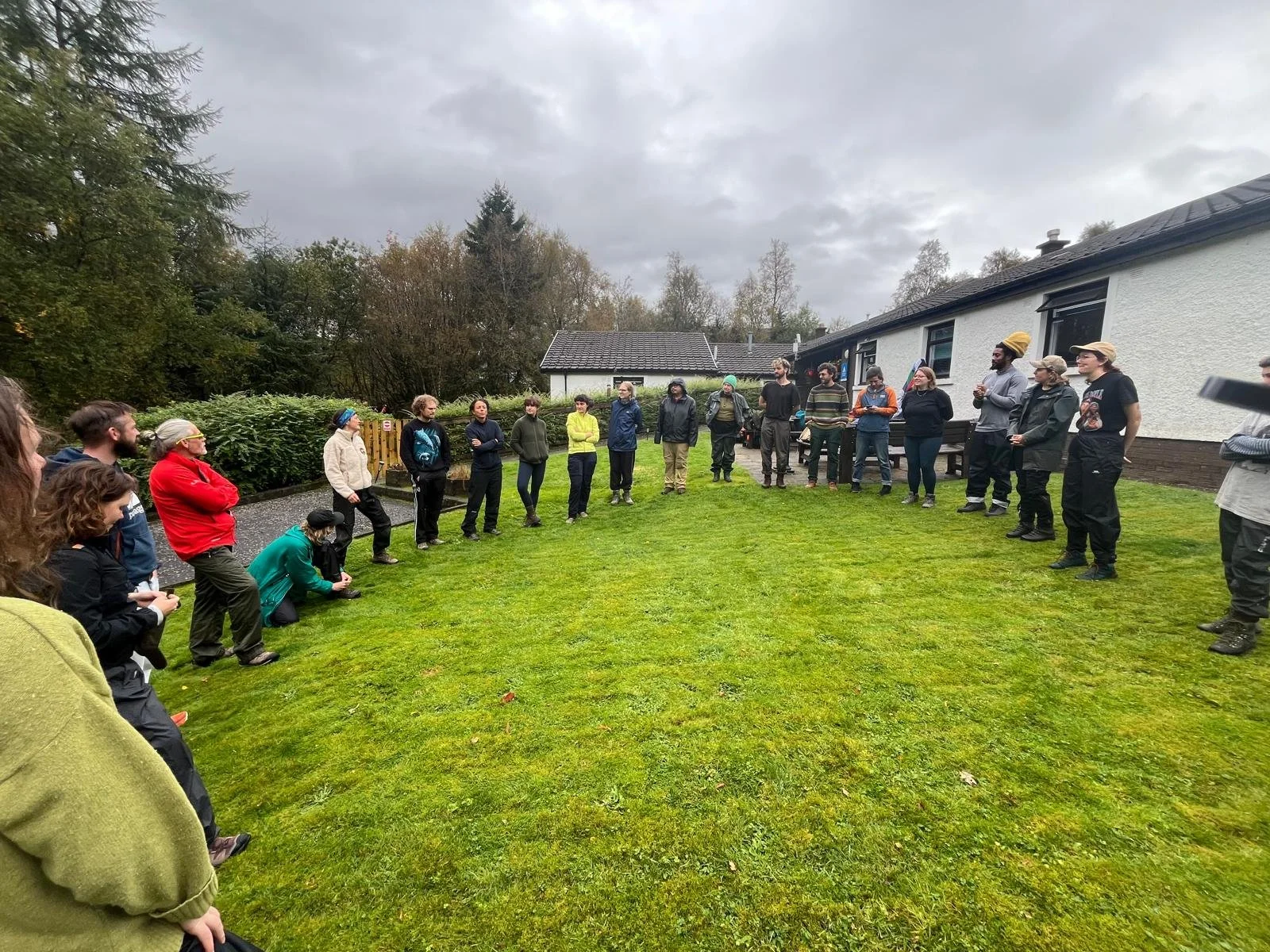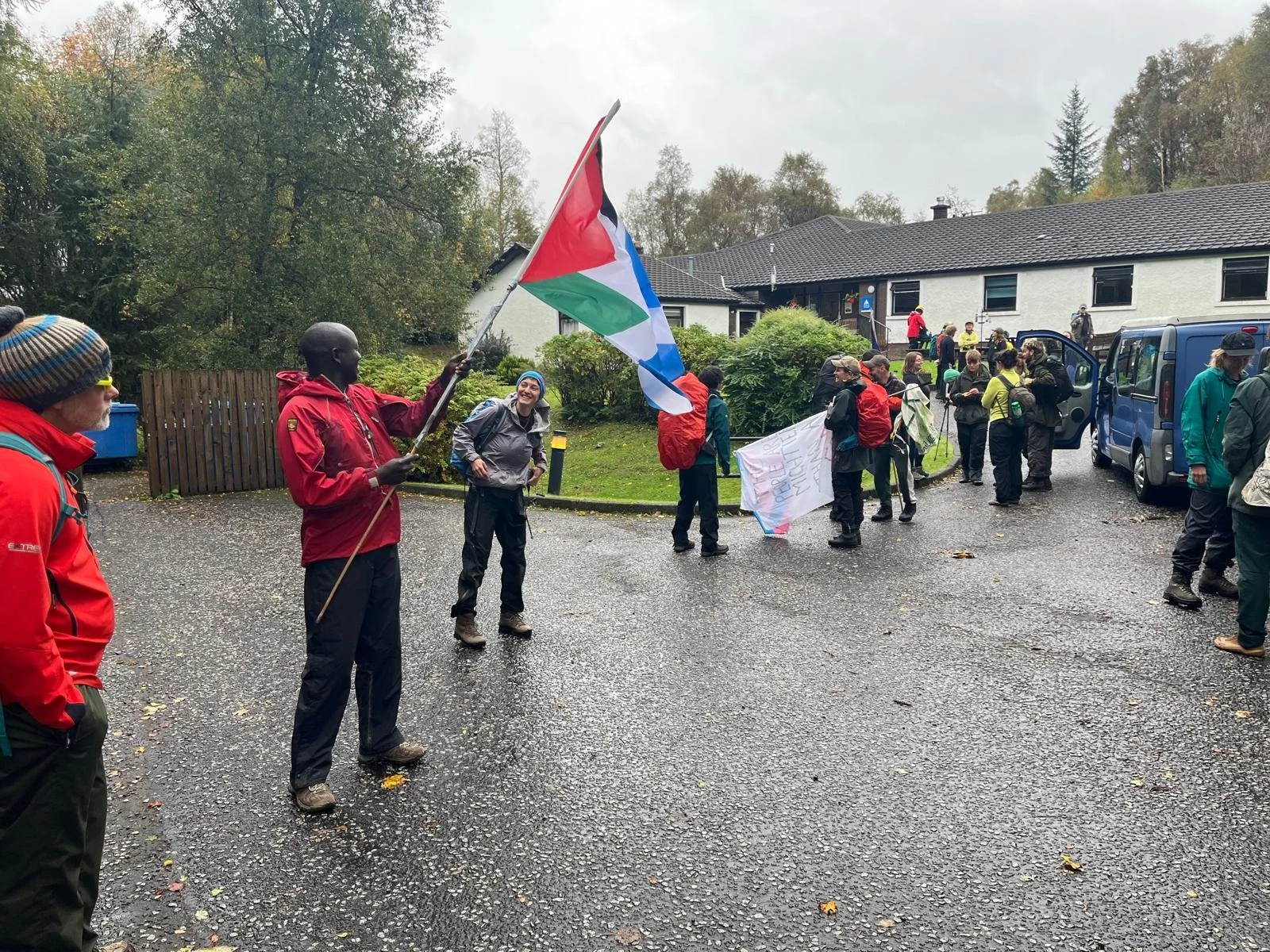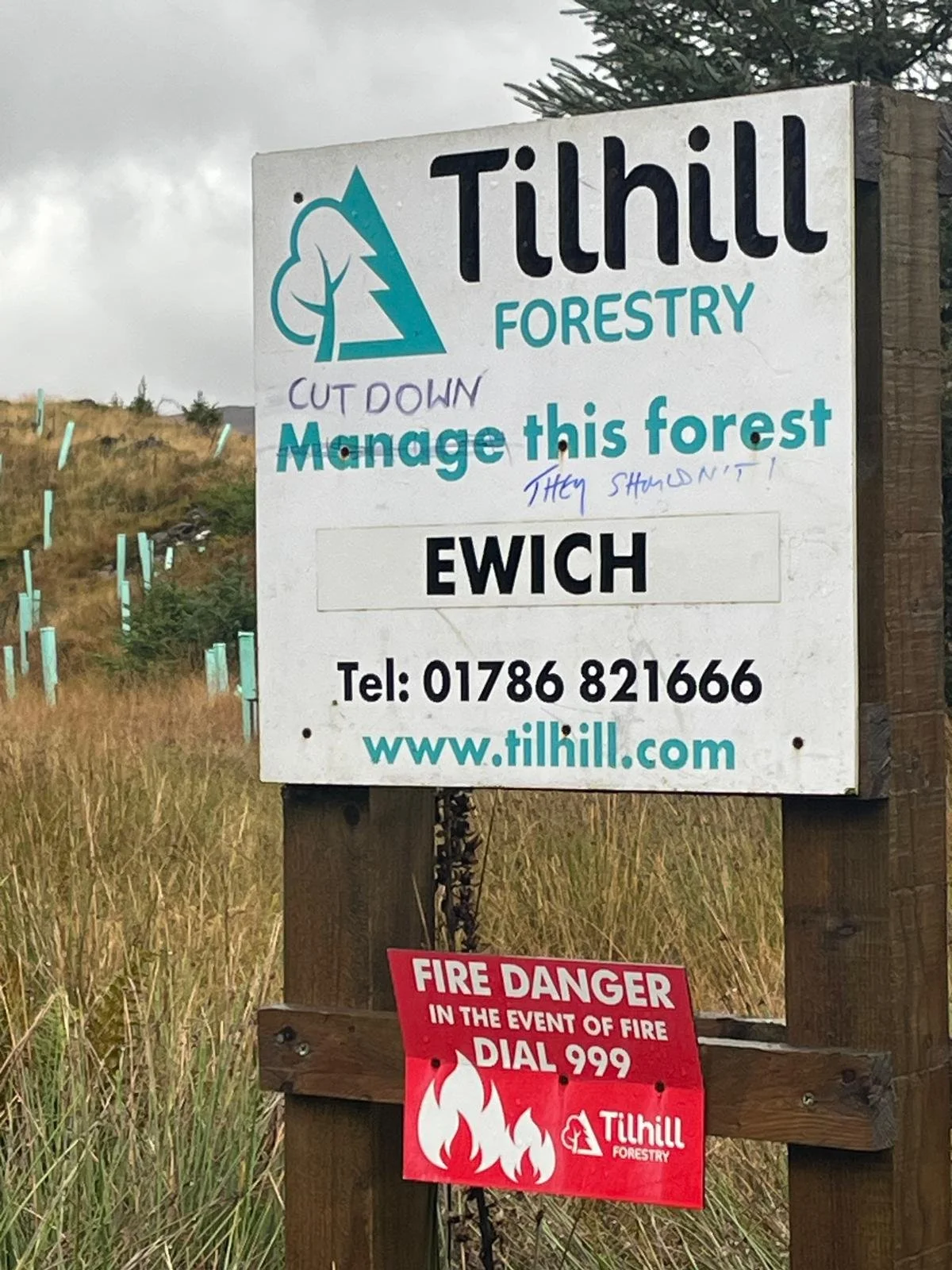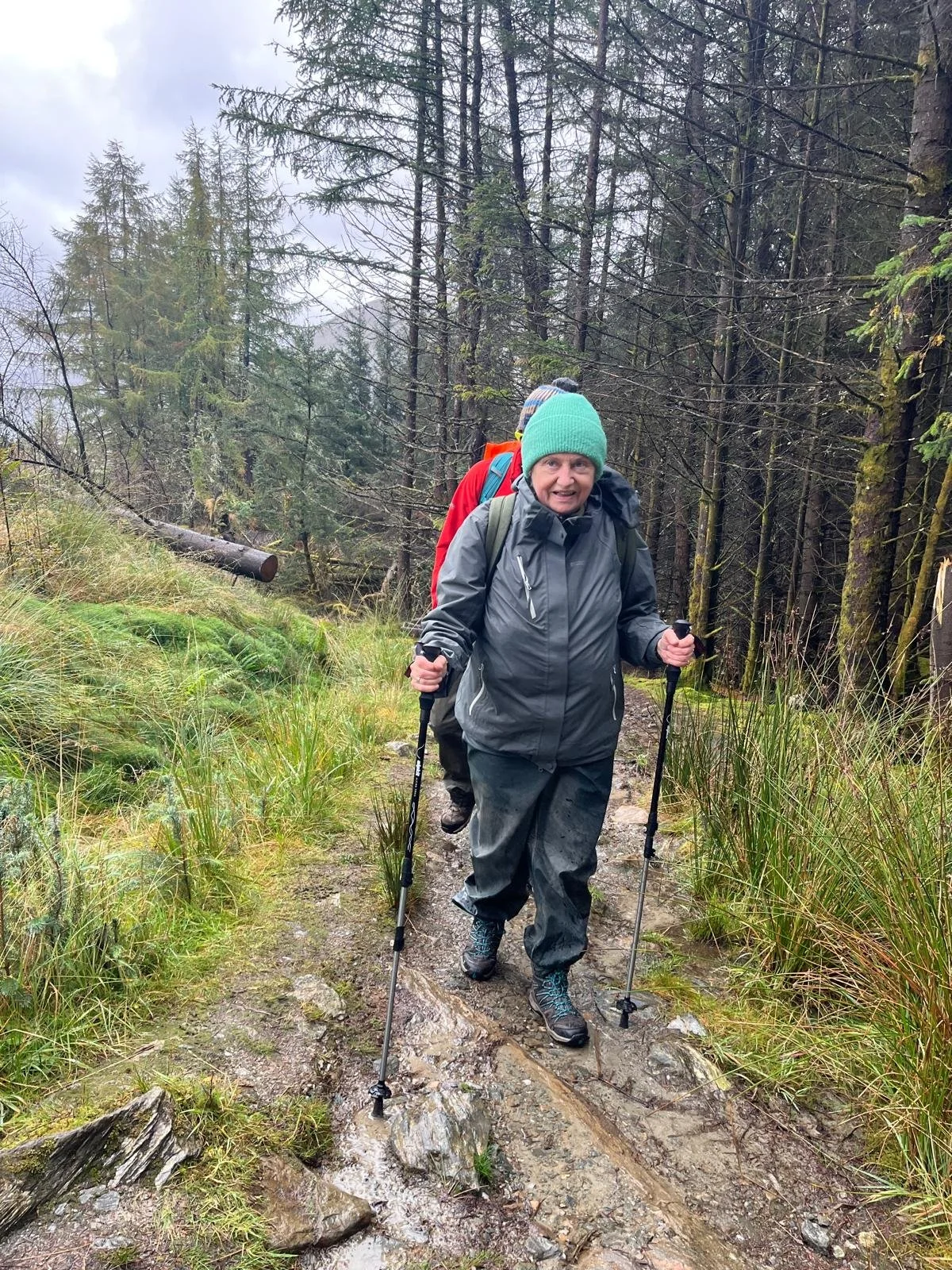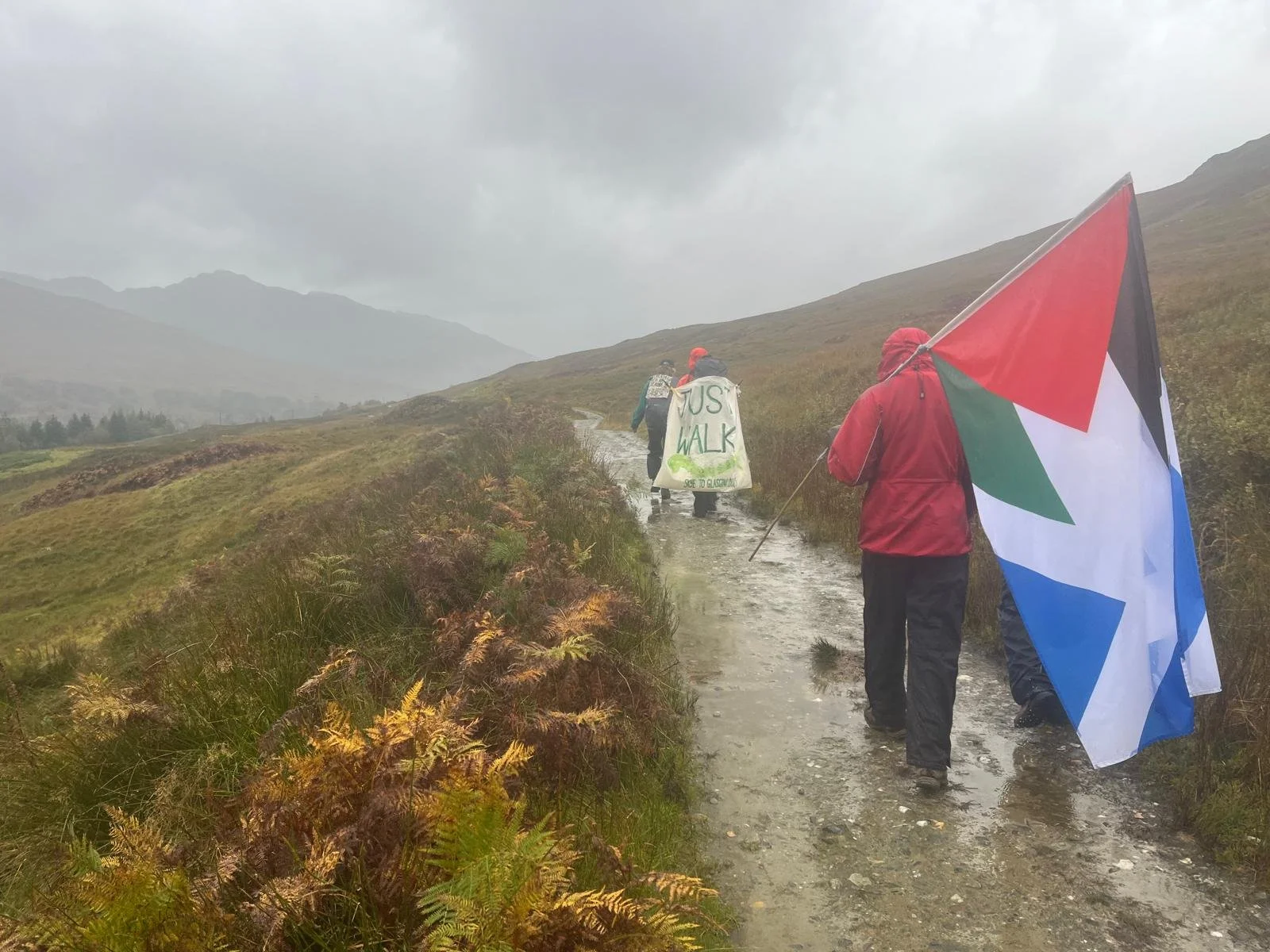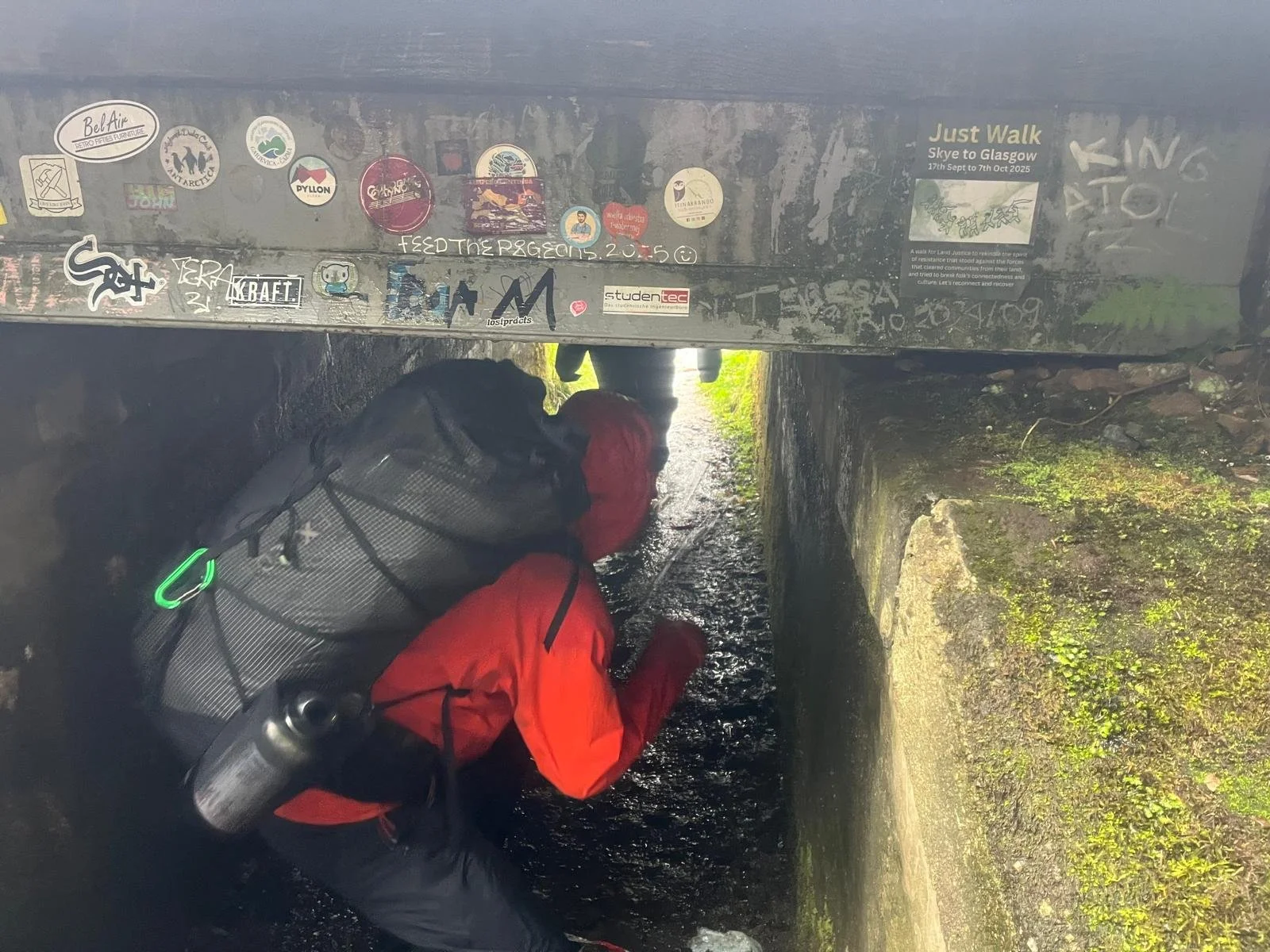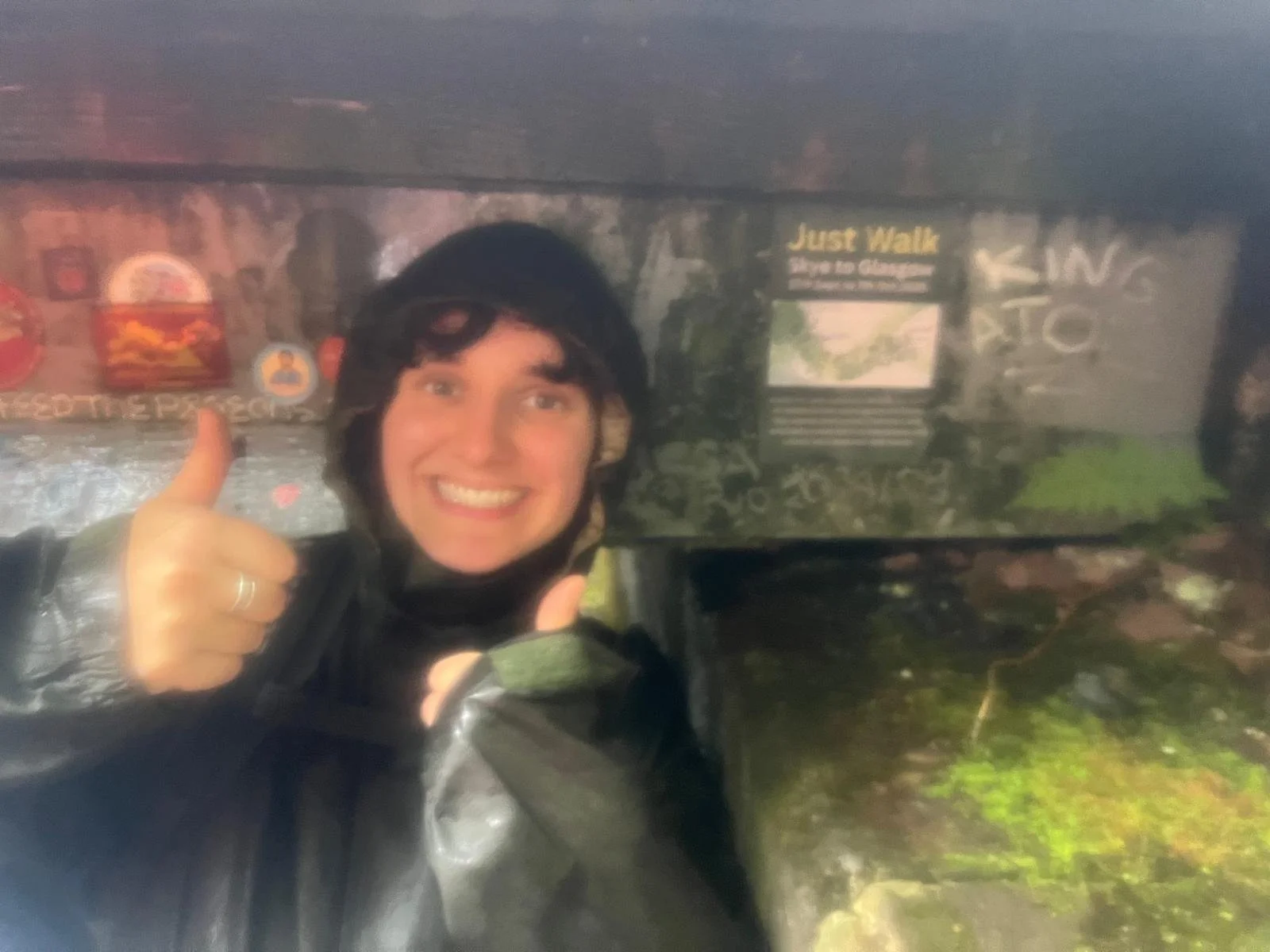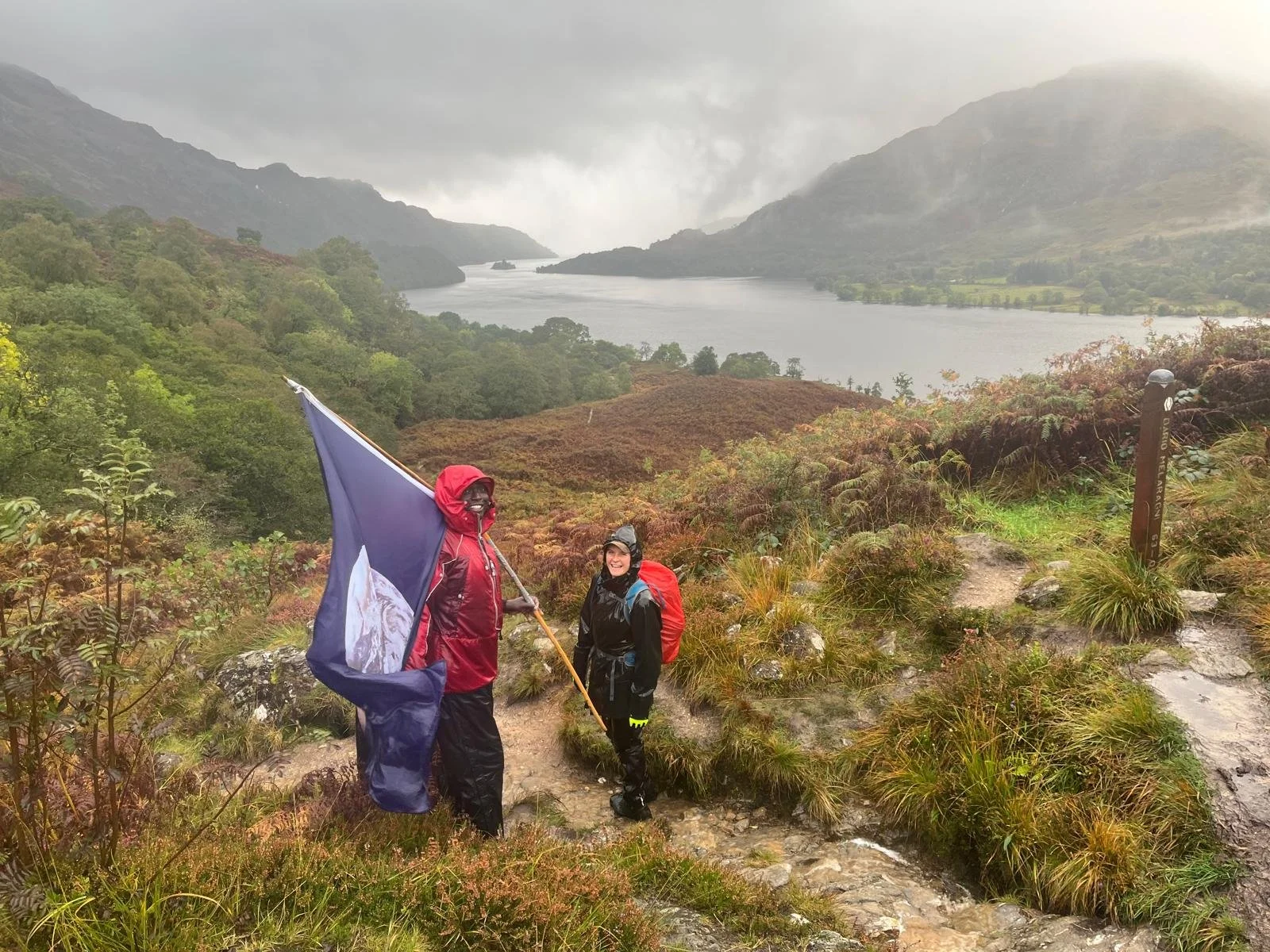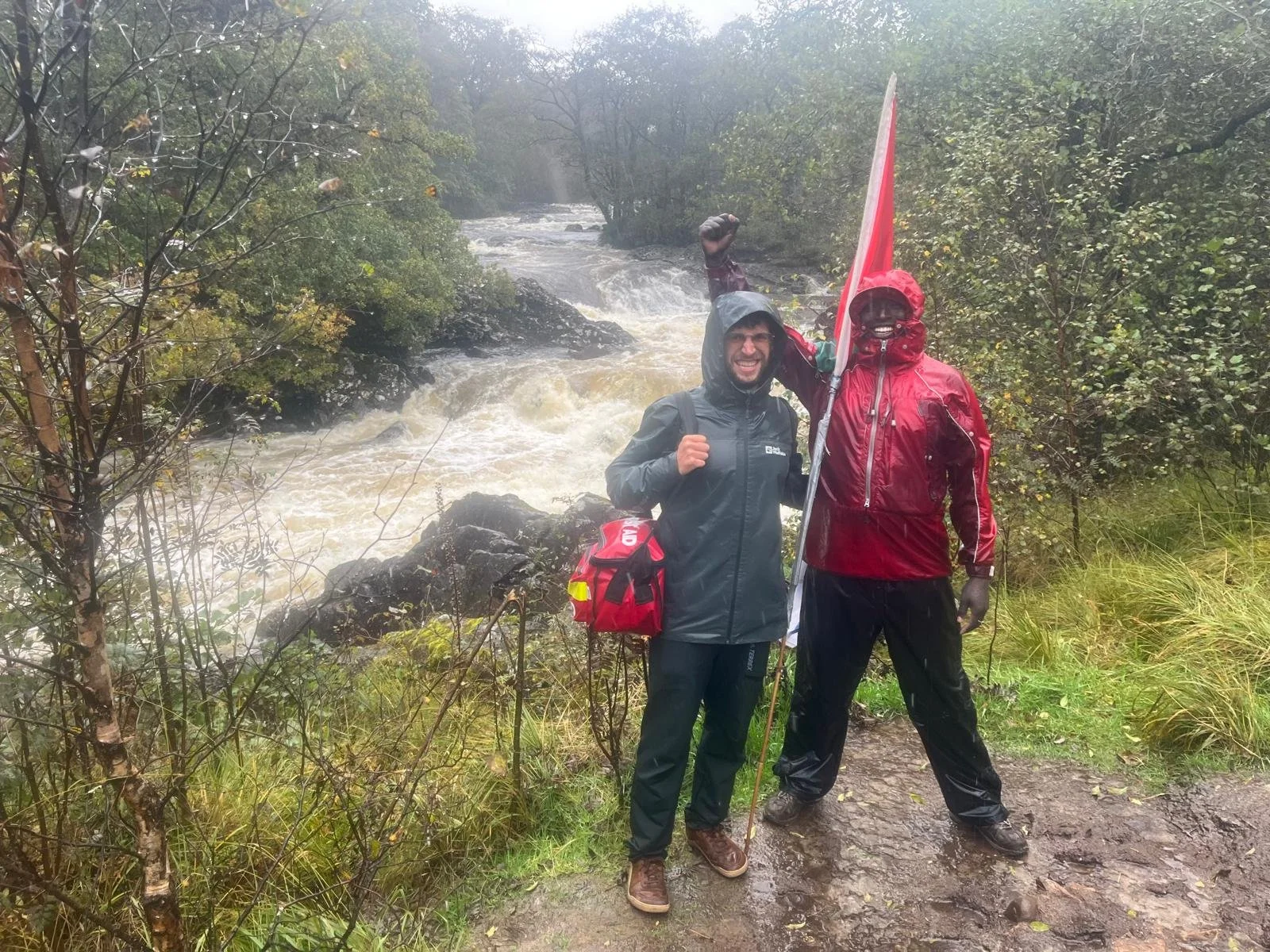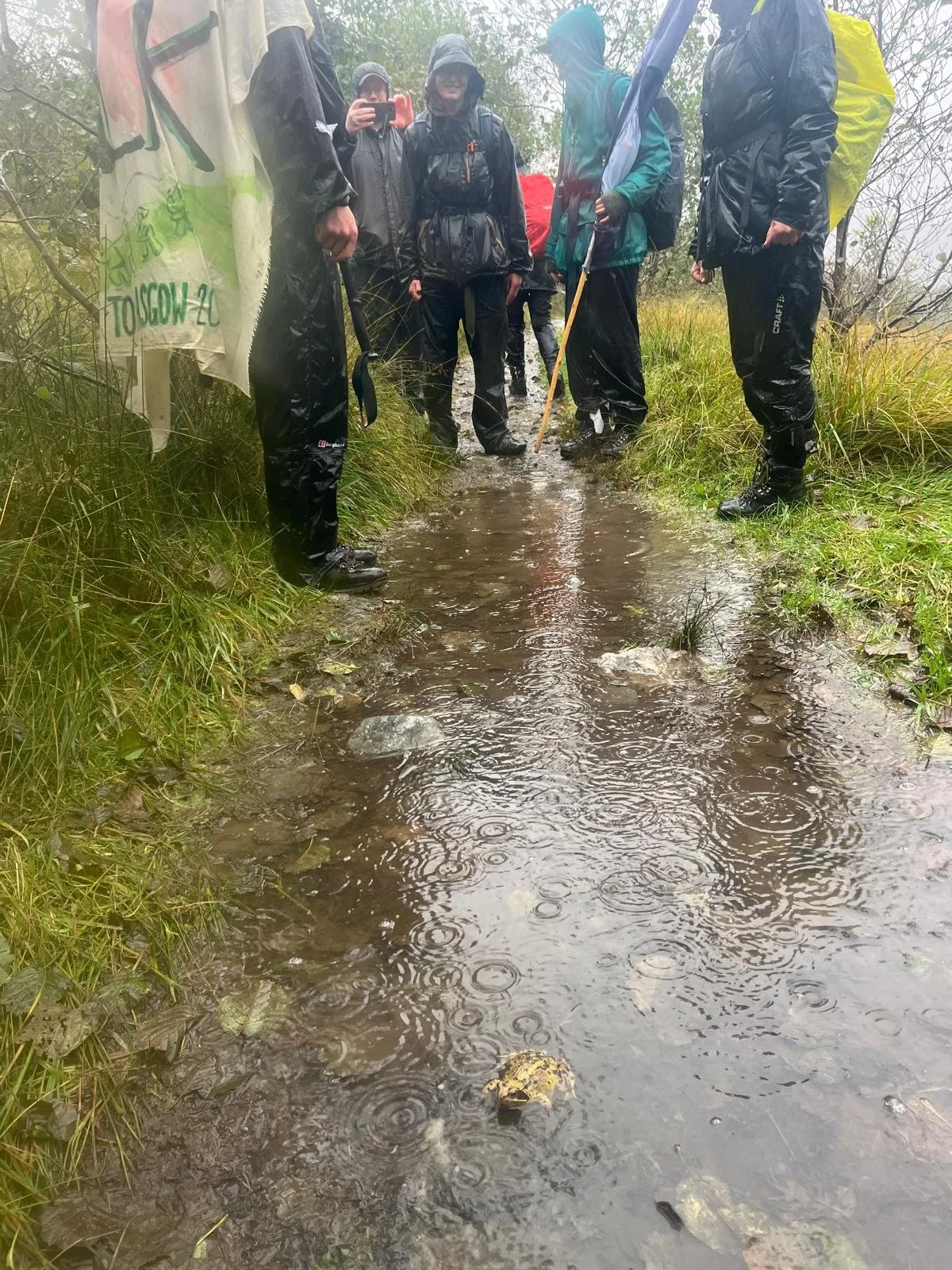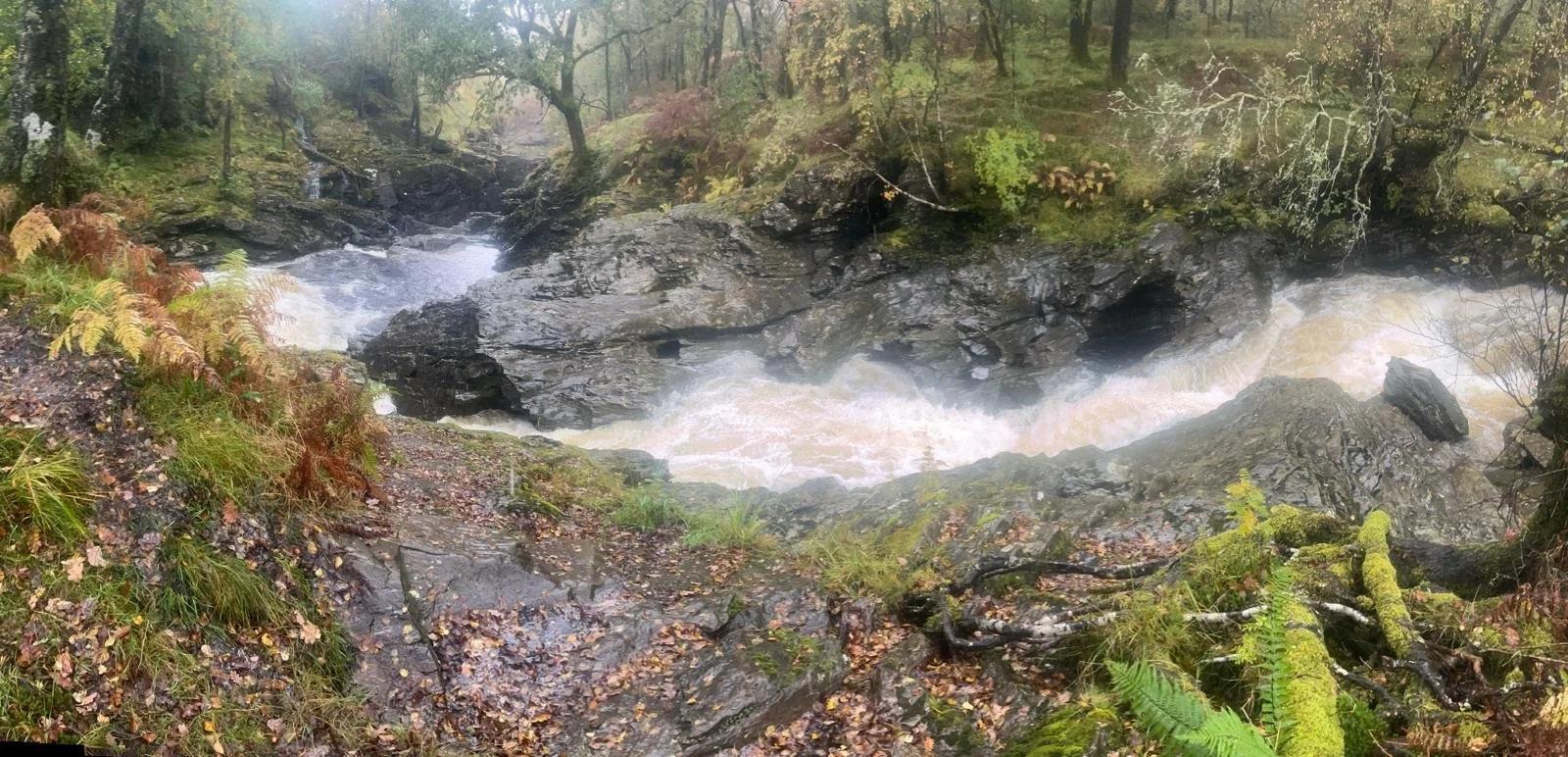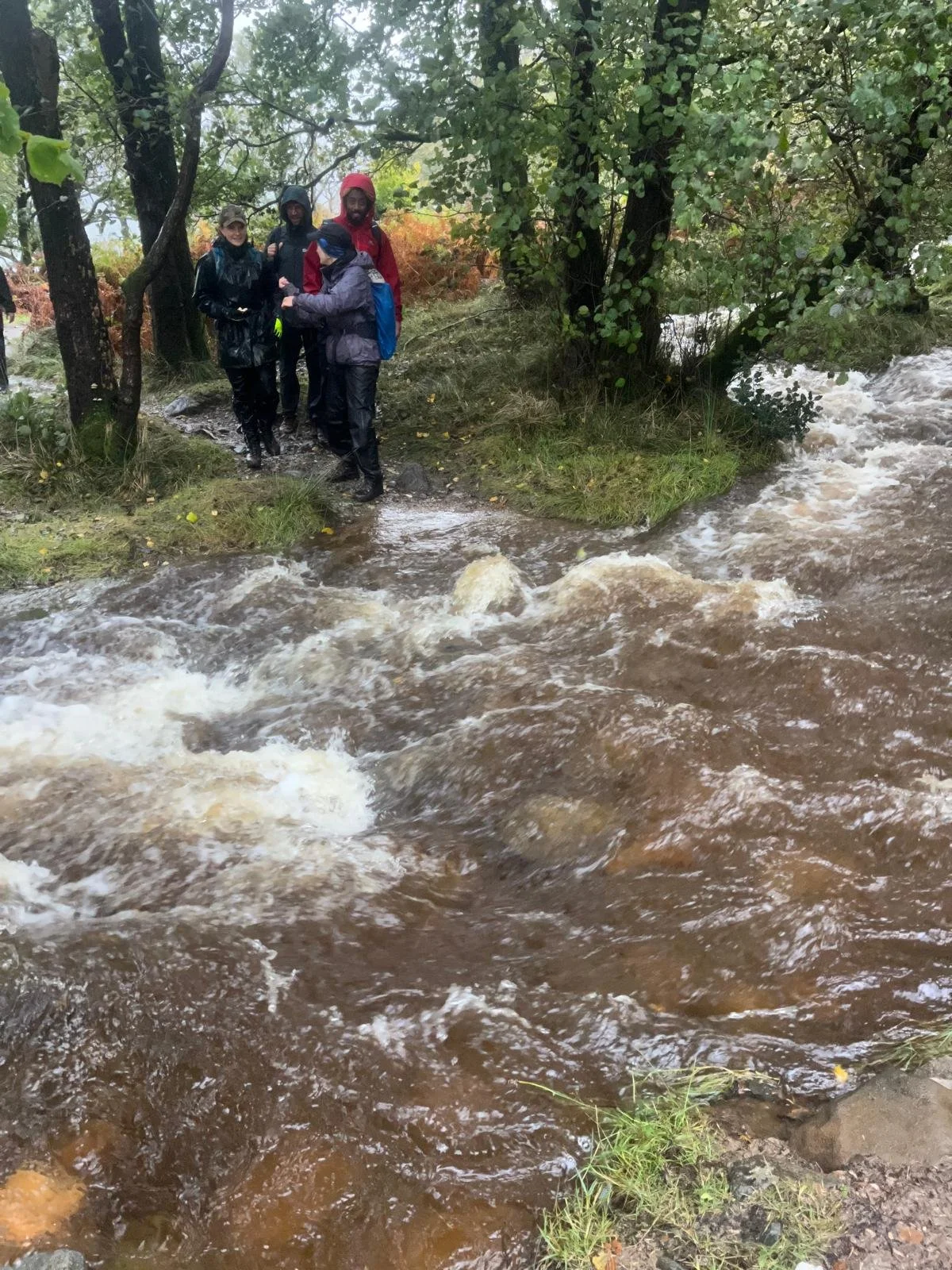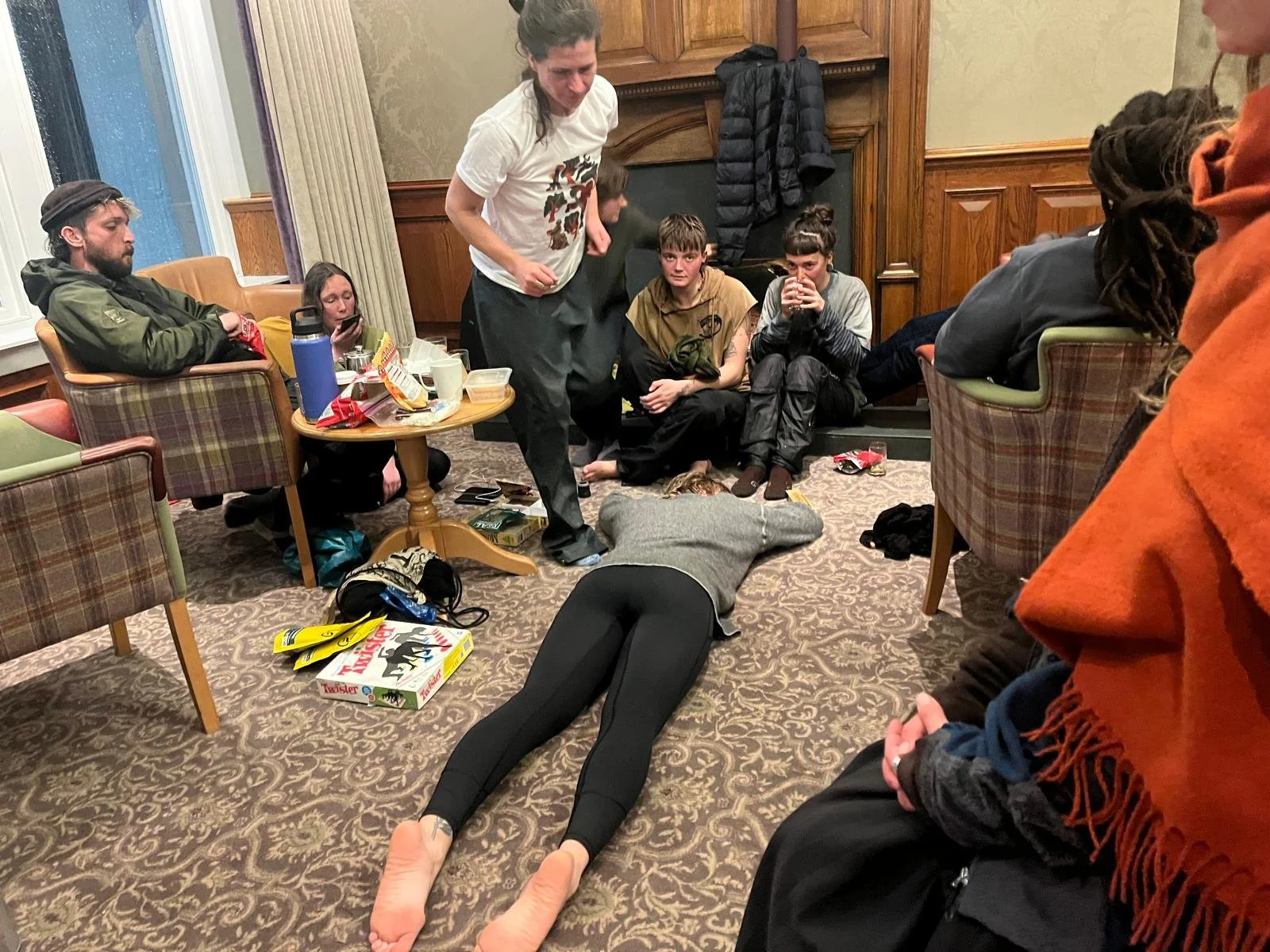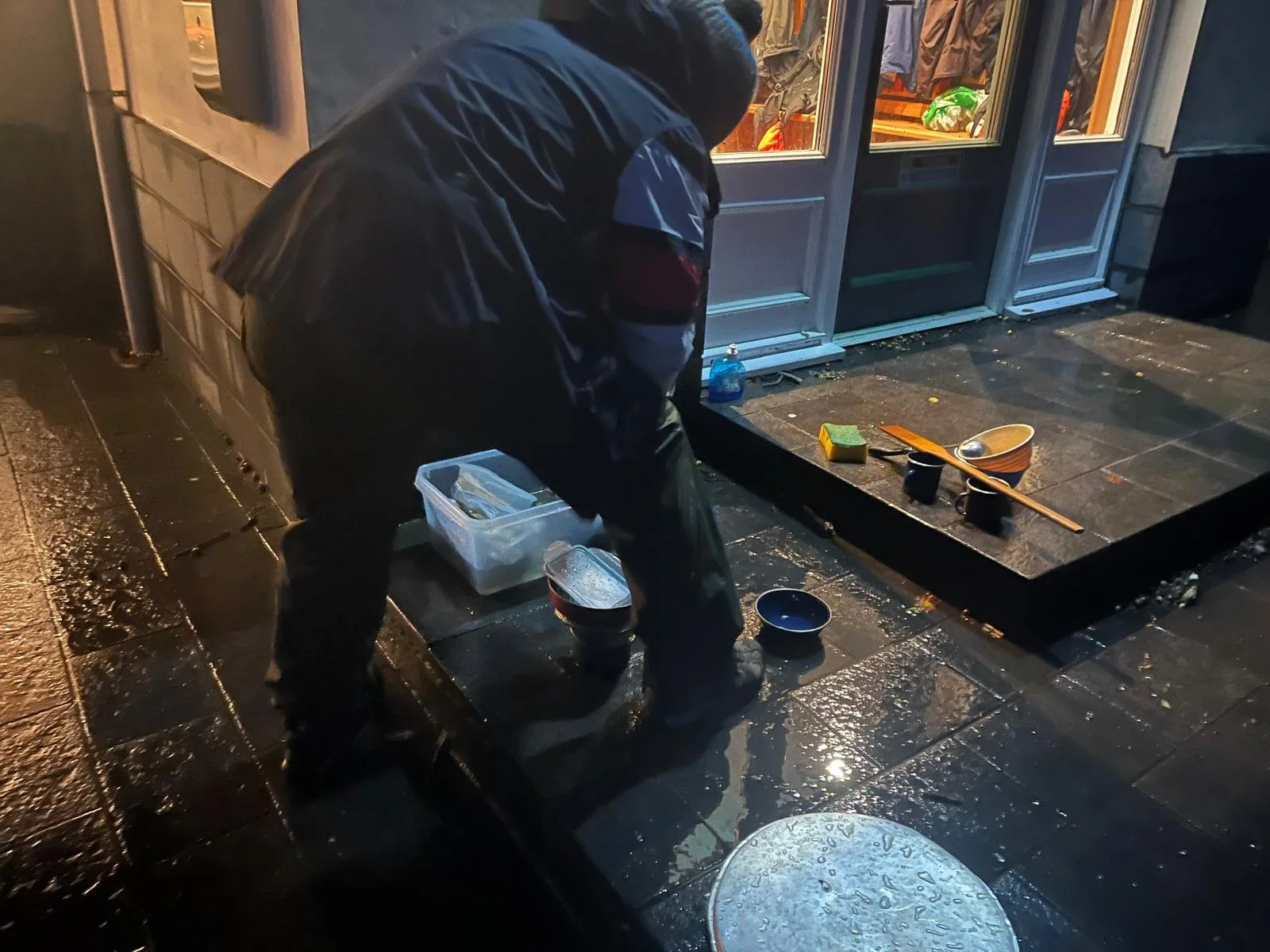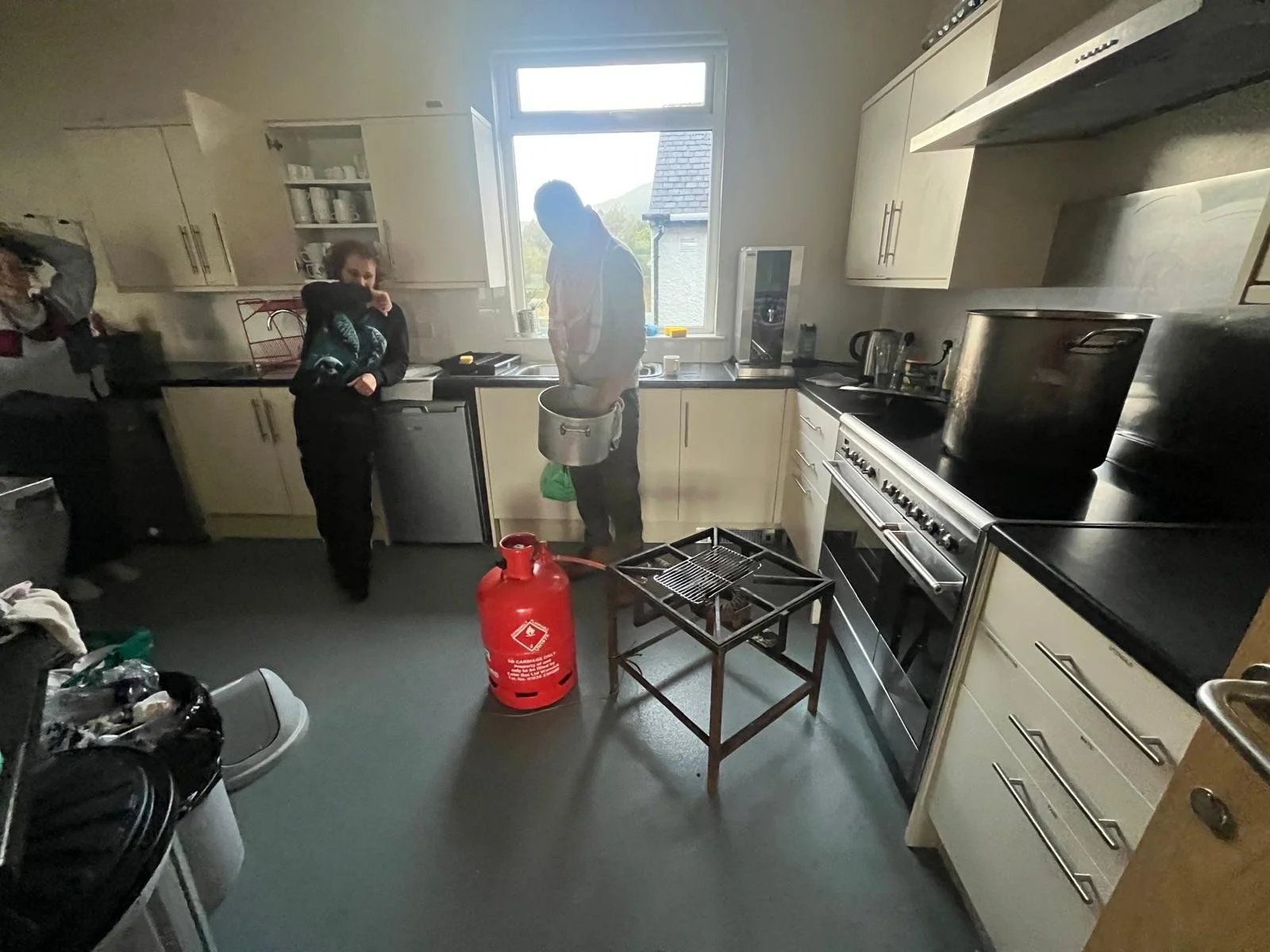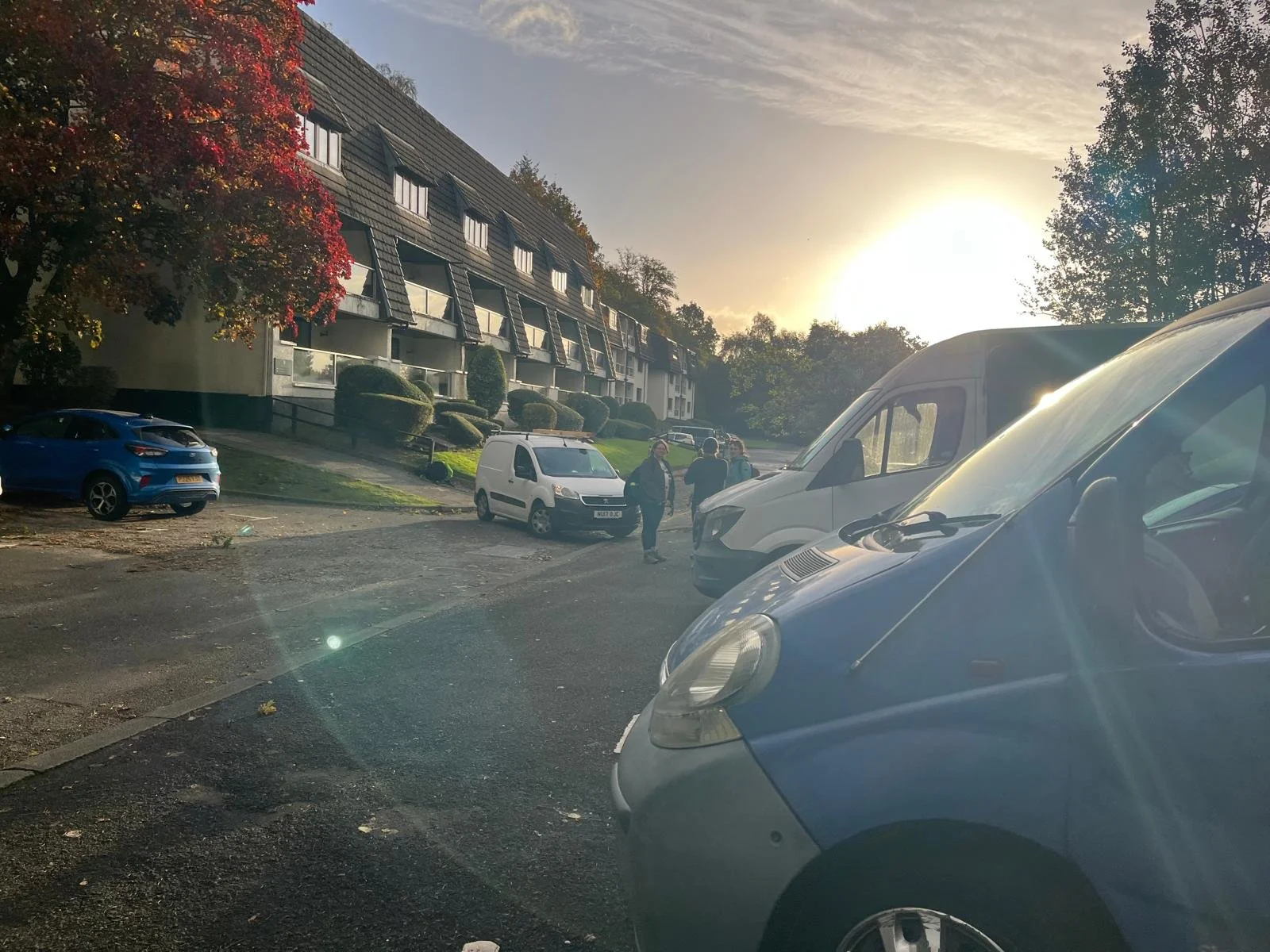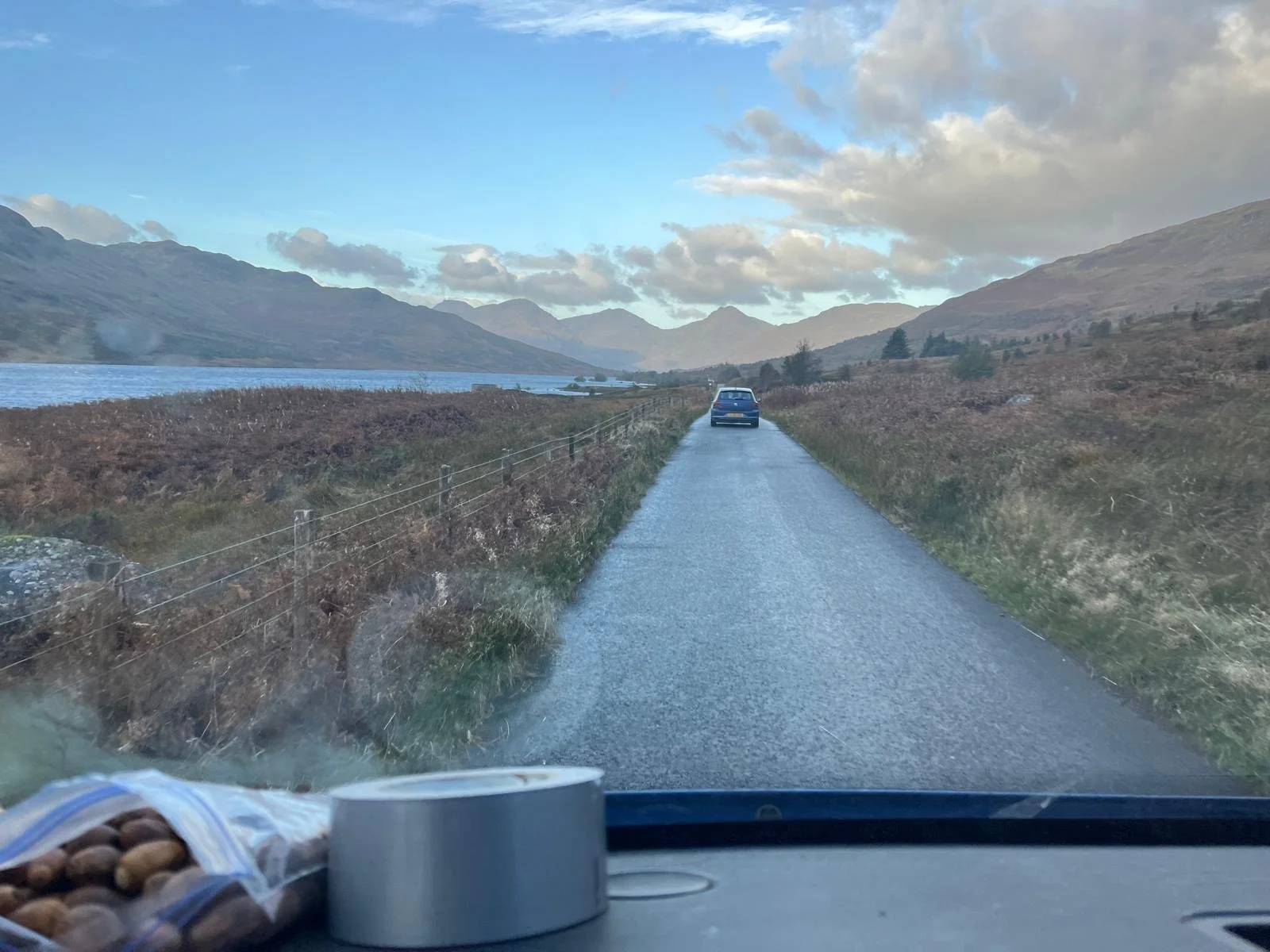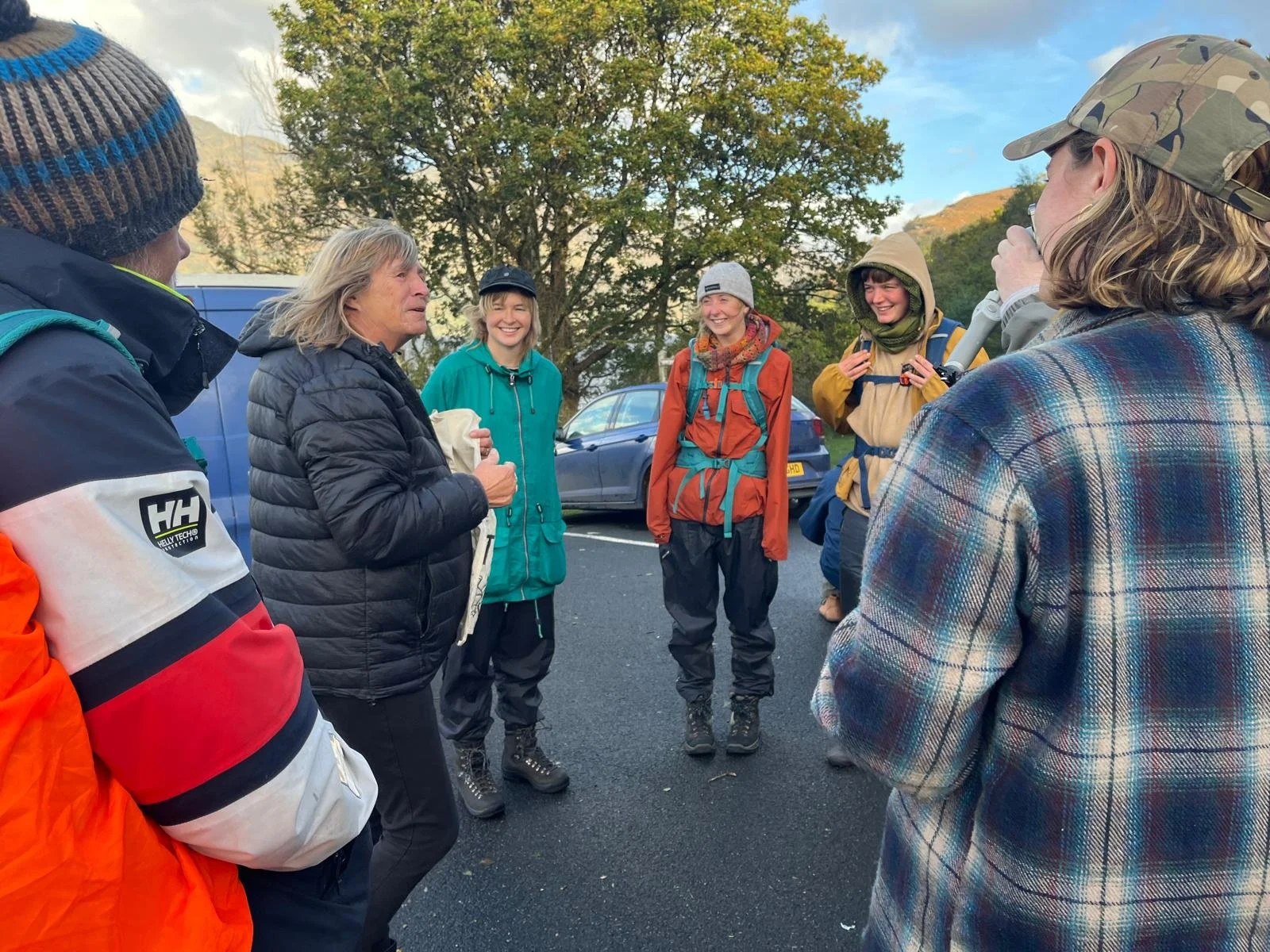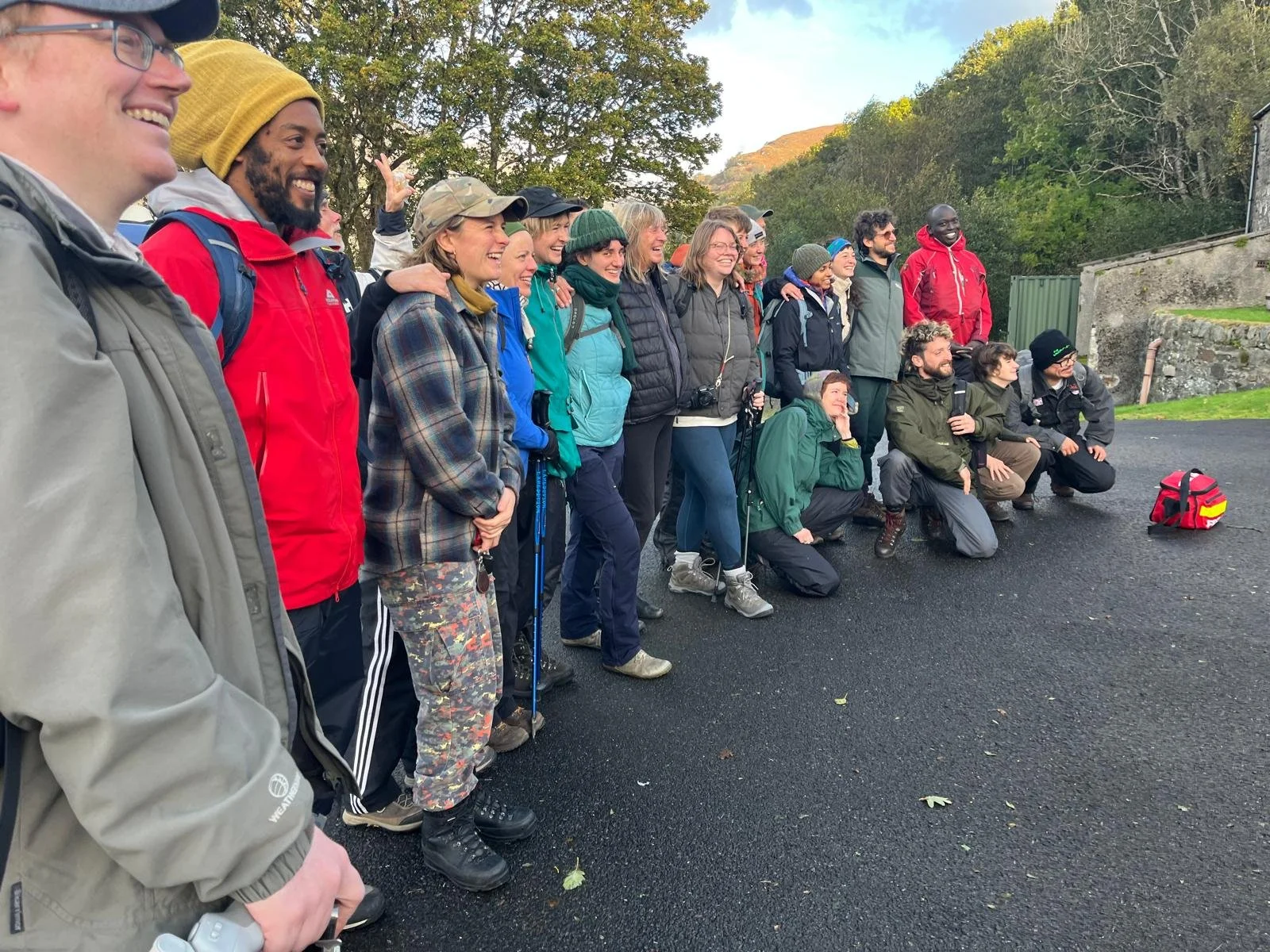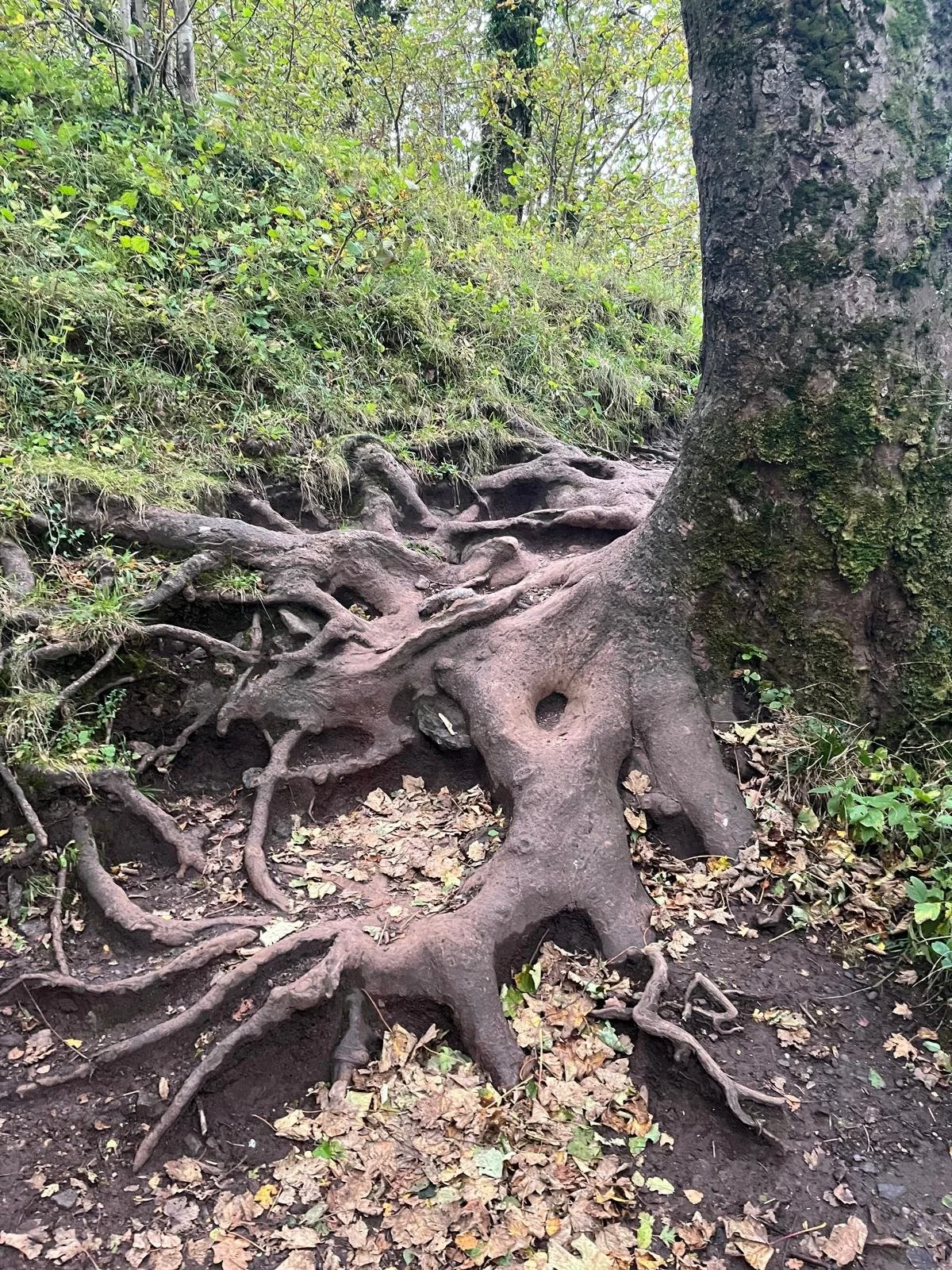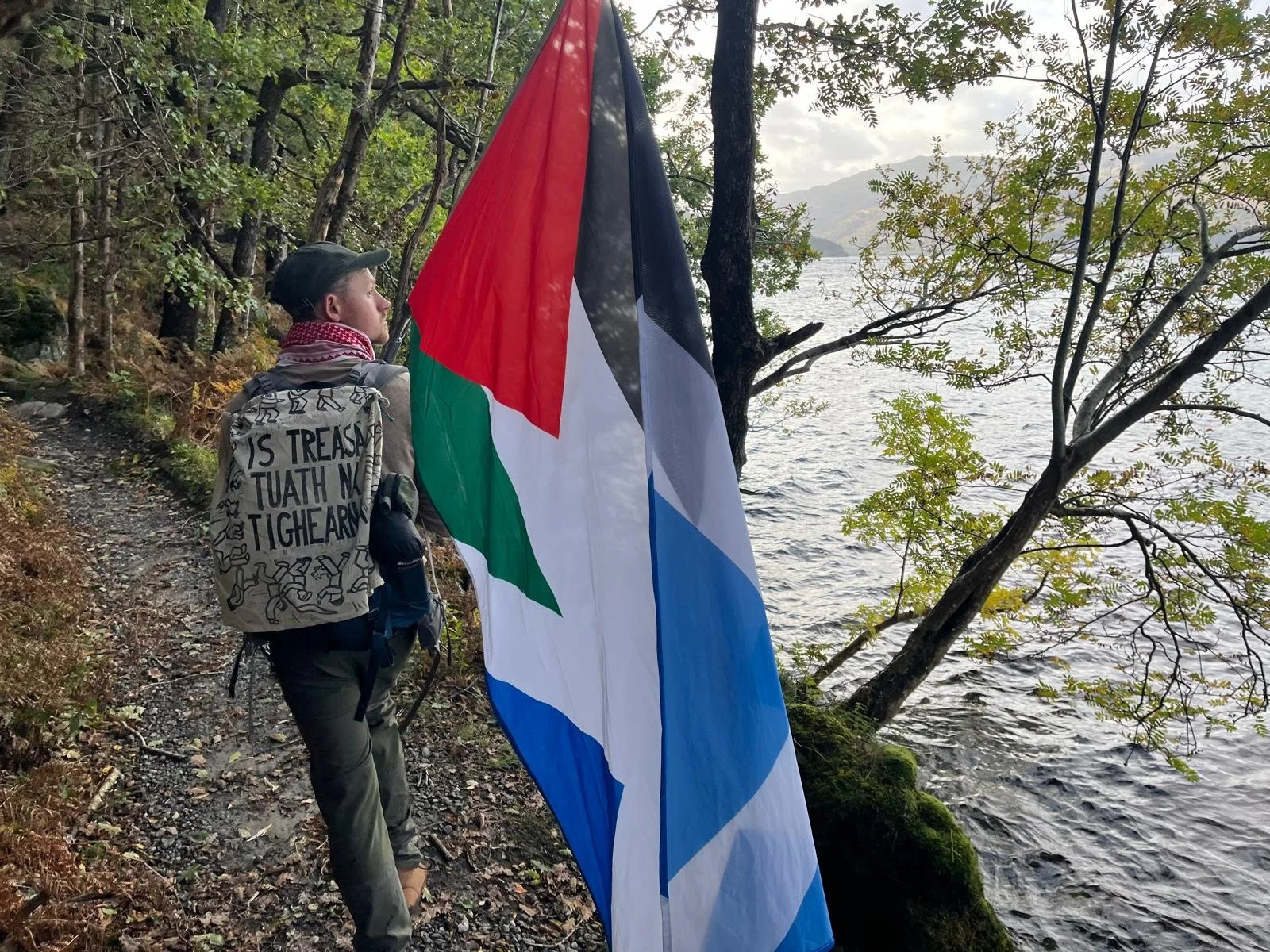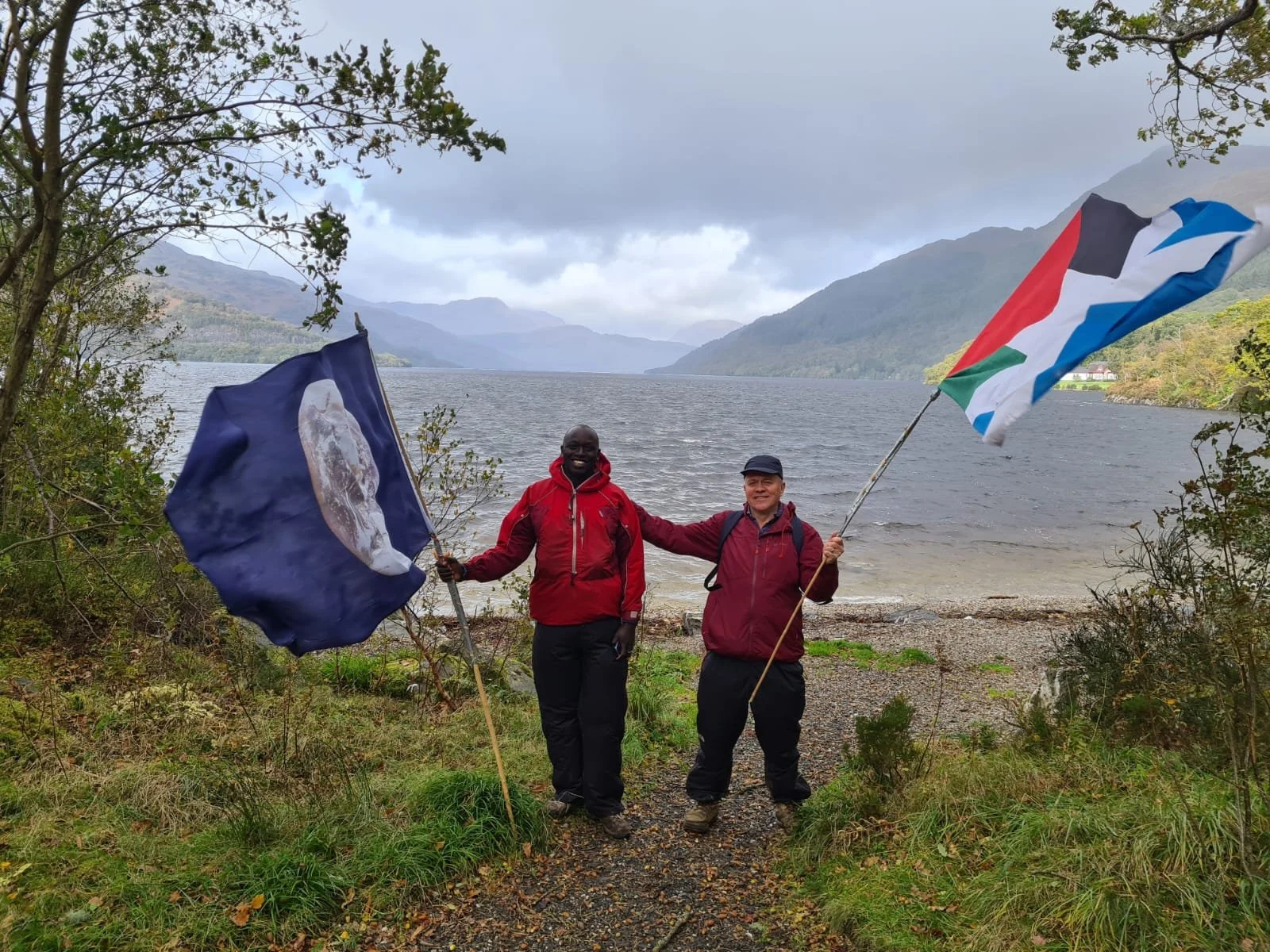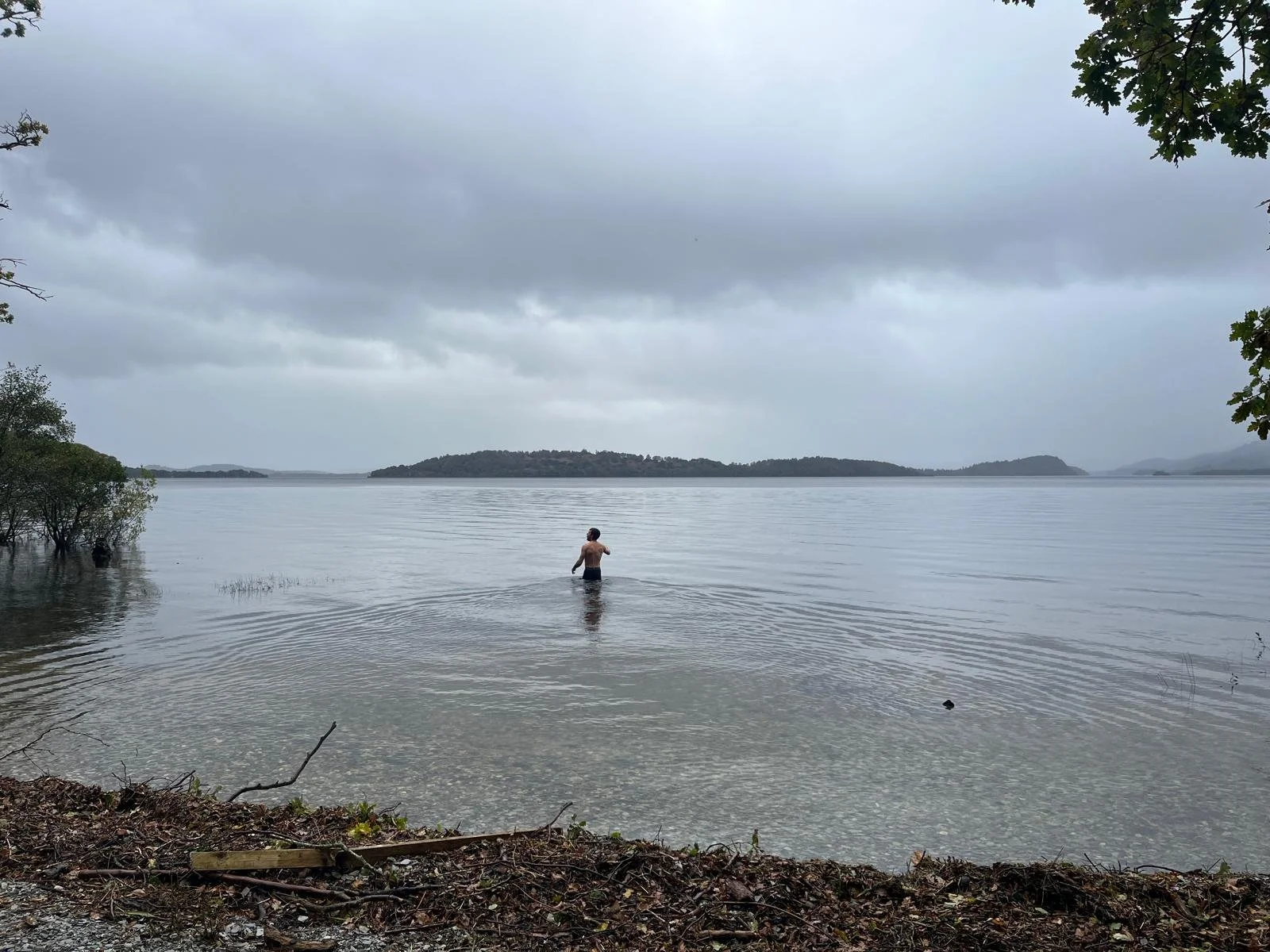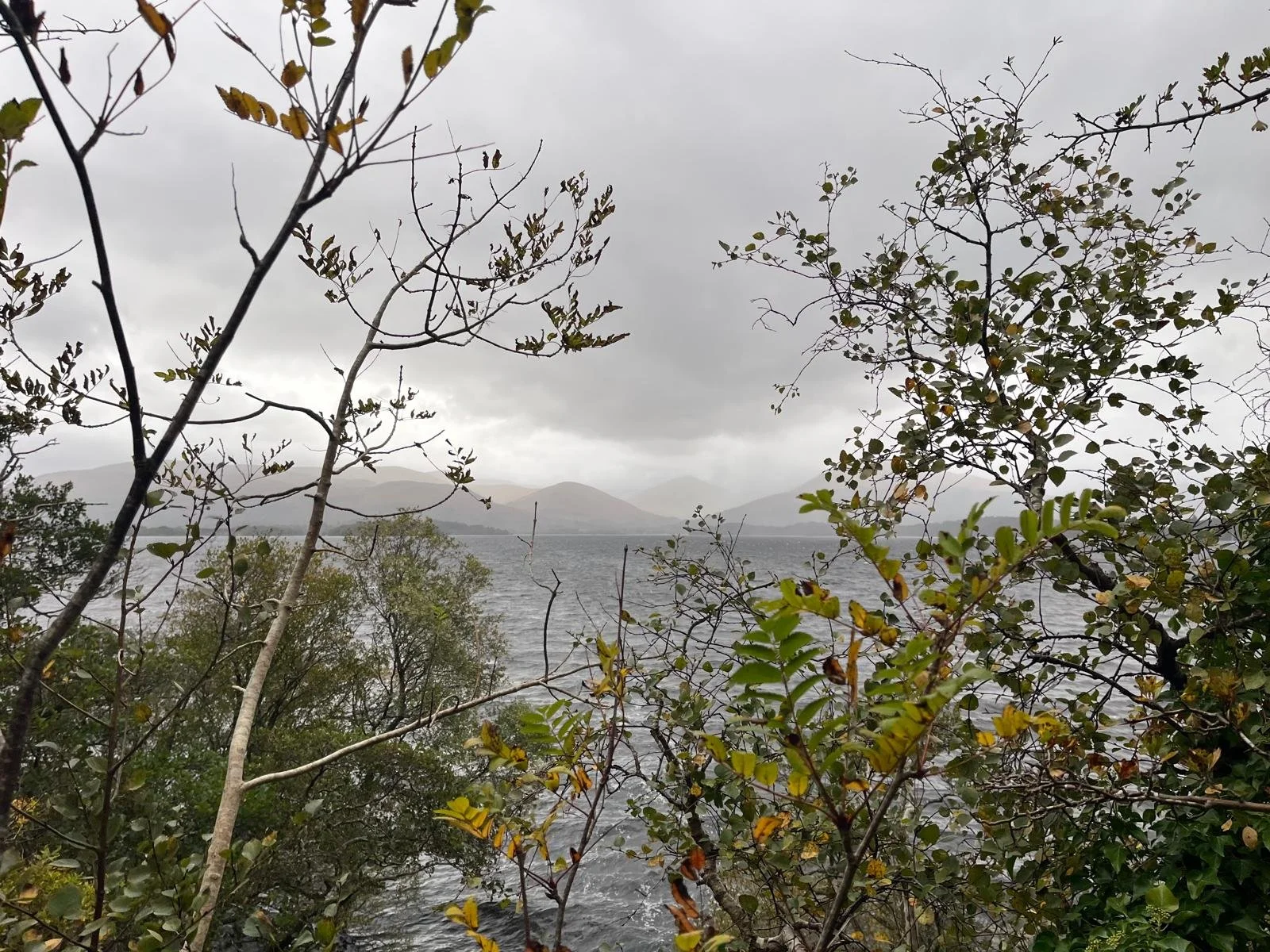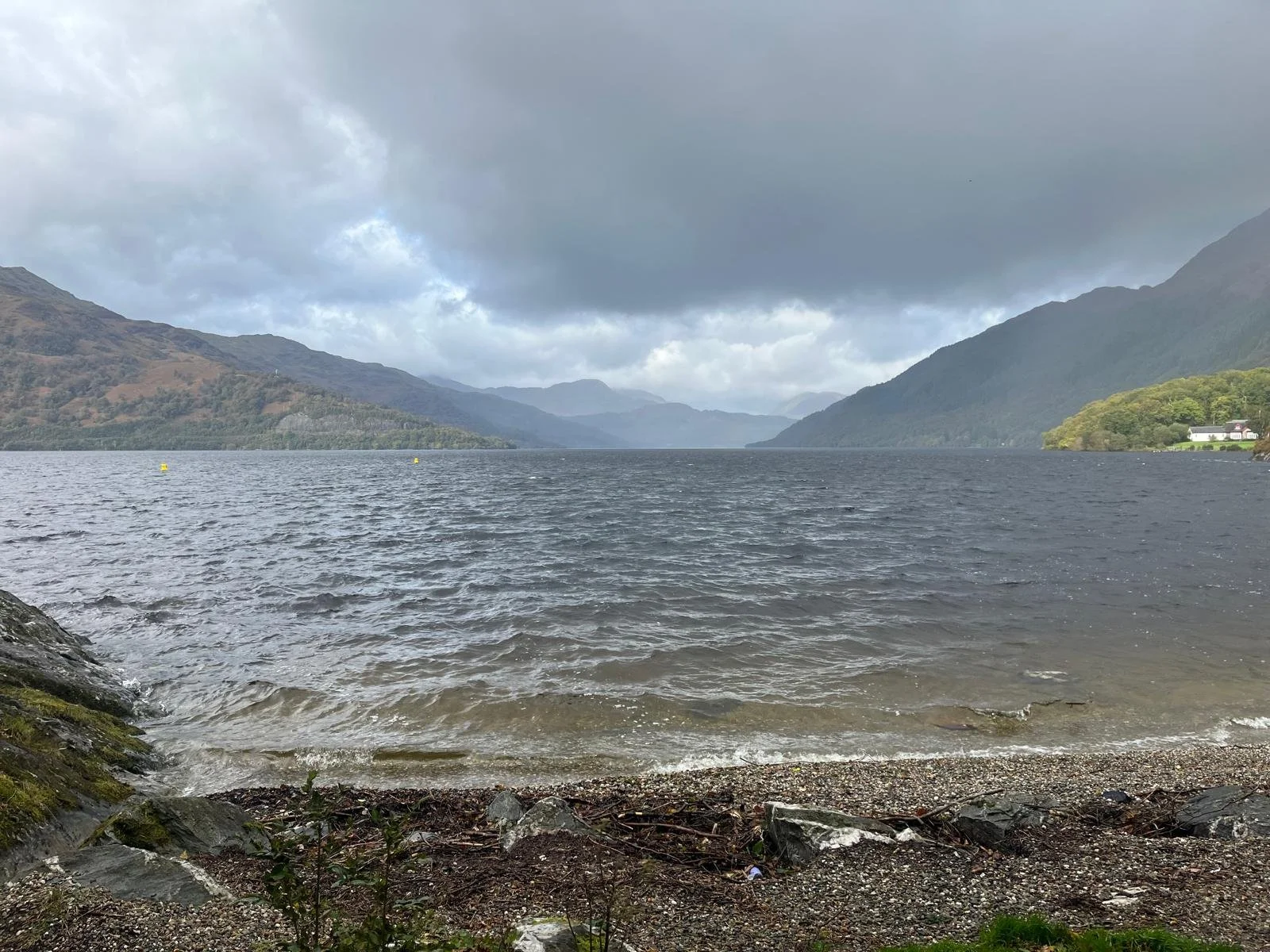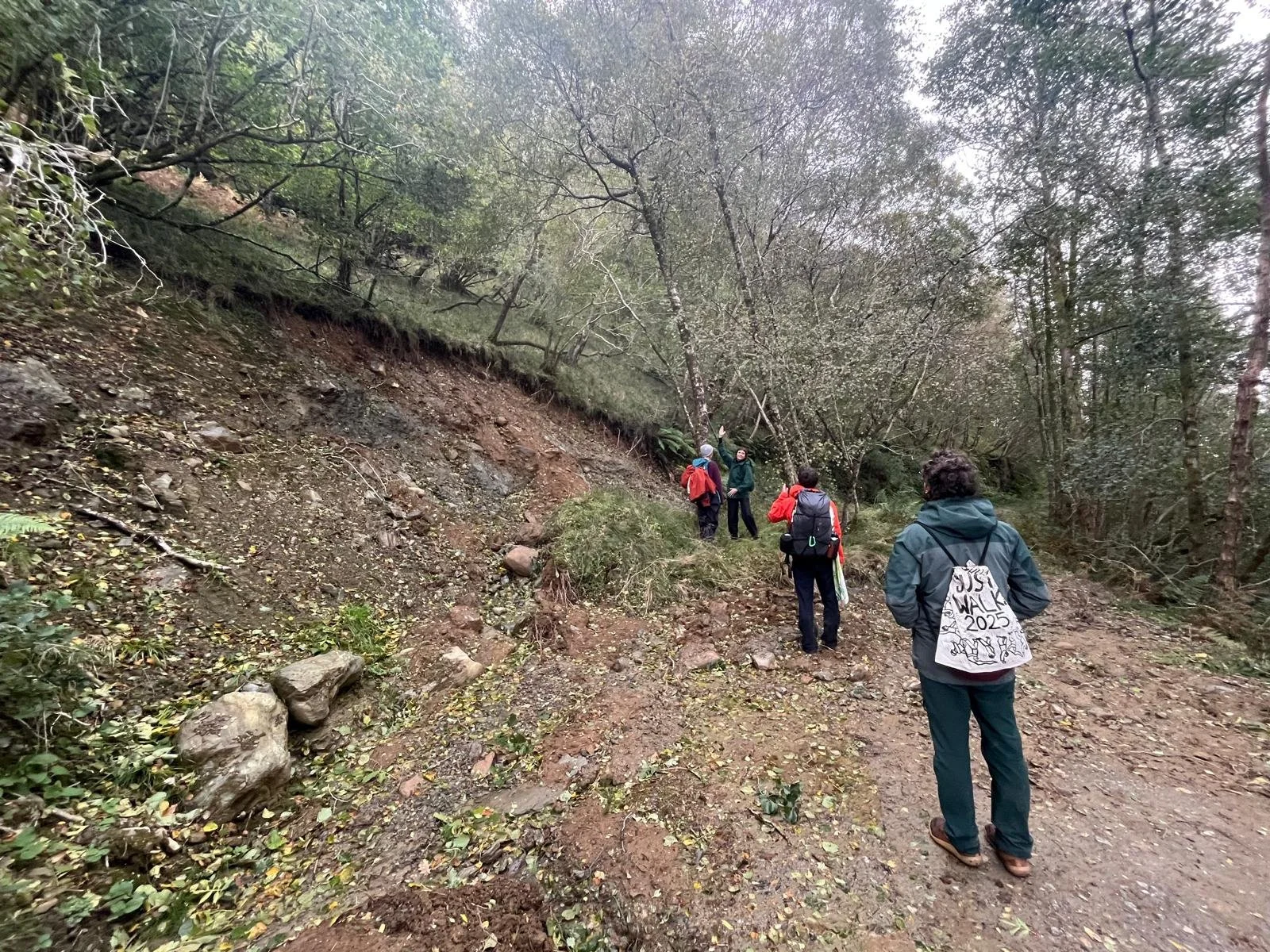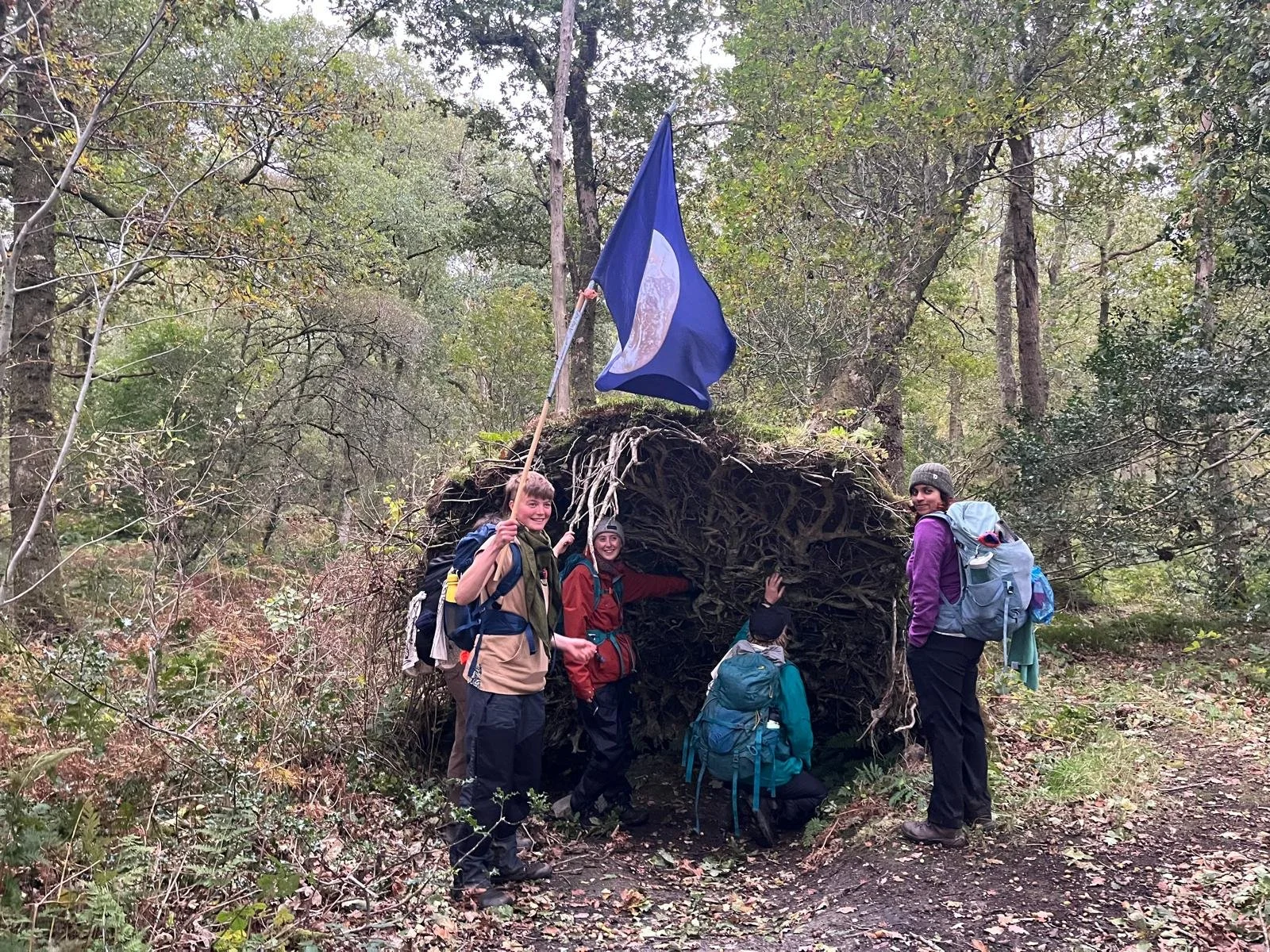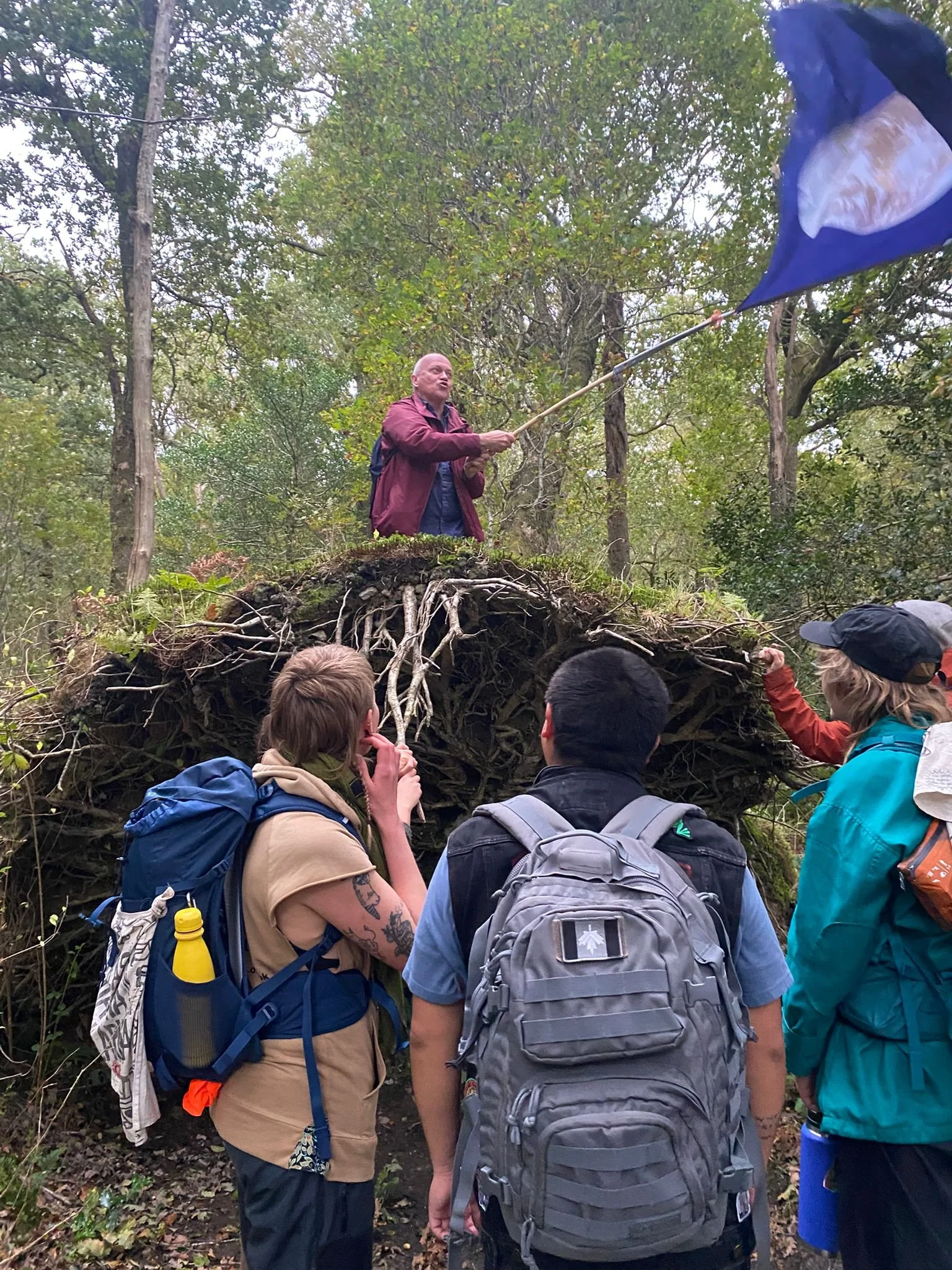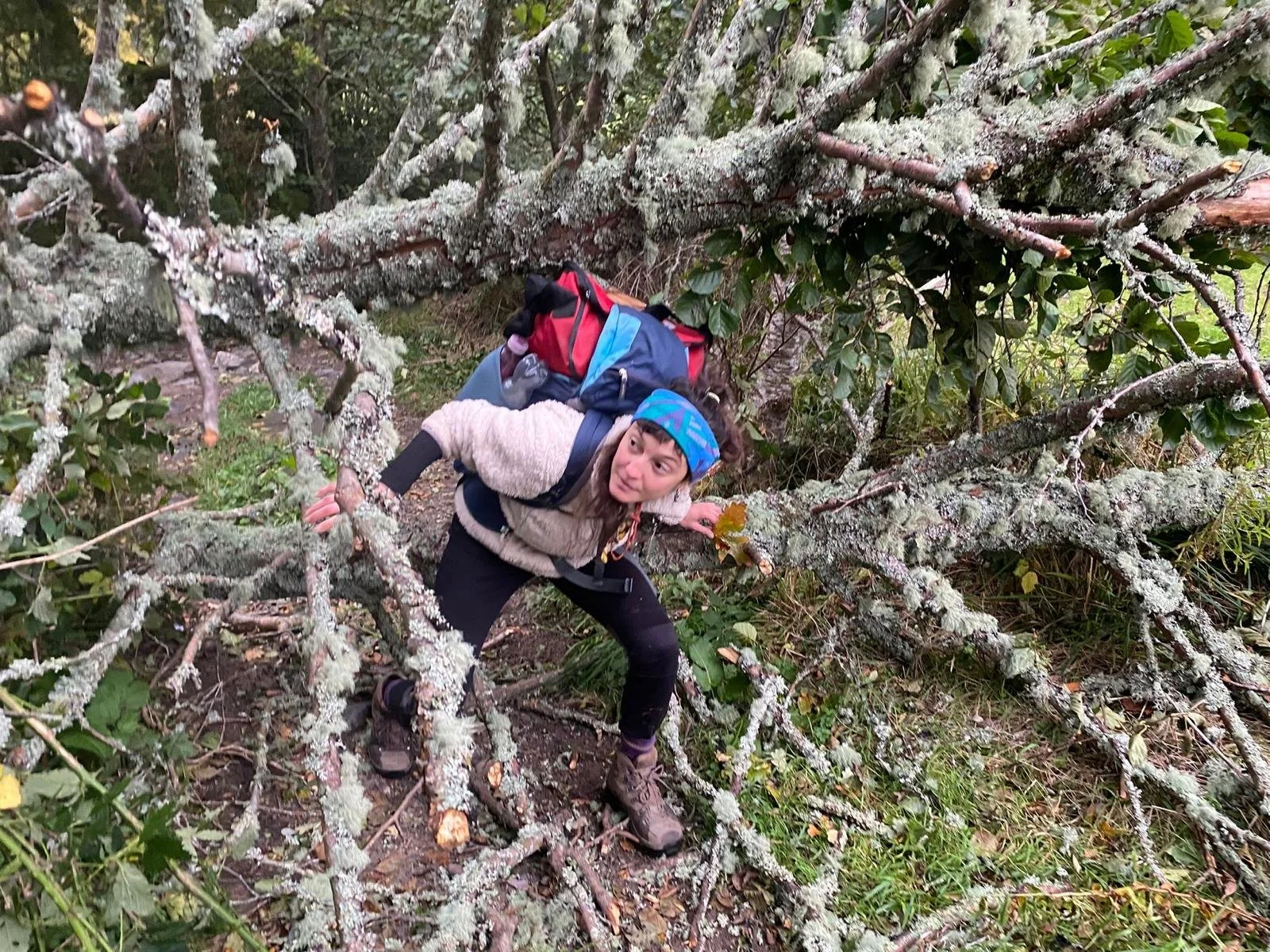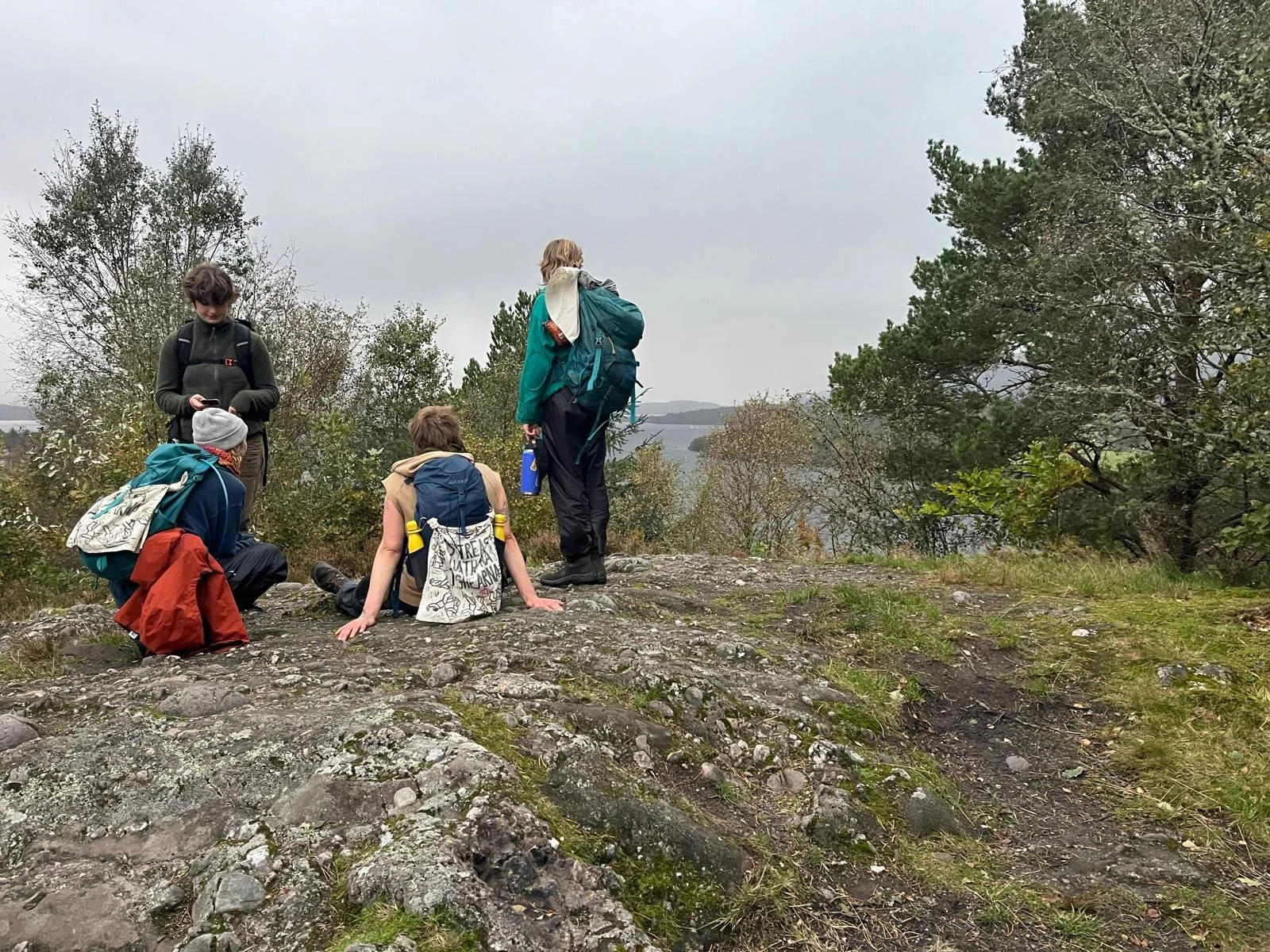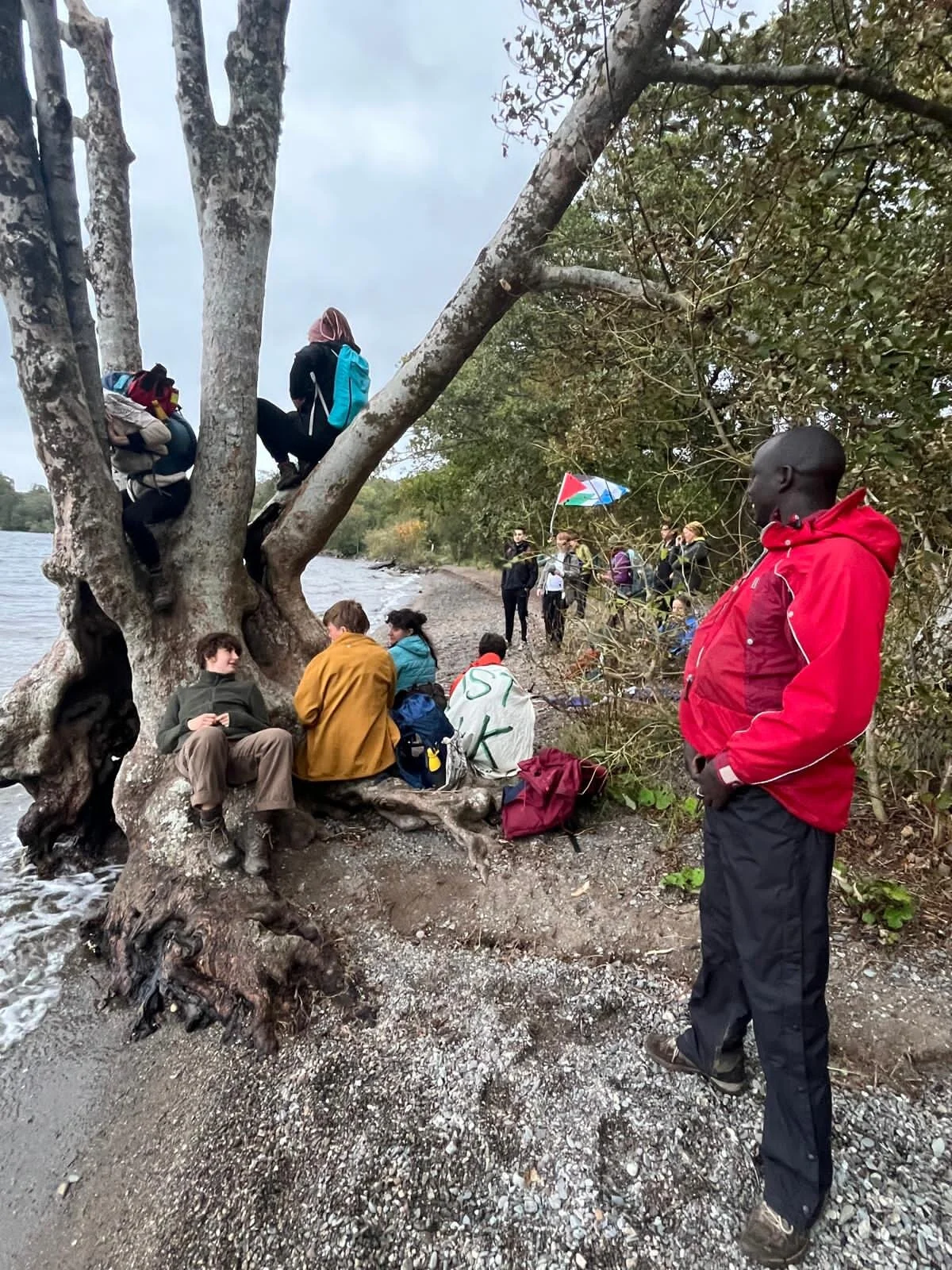Loch Lomond side - through the storm
Day 17 Crianlarich to Inversnaid - into the cauldron (13 miles)
21 folk gather in the circle on the lawn outside the Youth Hostel, preparing to walk for the day. Practicalities of route and roles get sorted, with 3 folk joining us only so far as the head of Loch Lomond where they’ll leave us to catch a bus to Glasgow, before we begin the path that will snakes wet and flooded, up and down, through trees roots and rocky slopes.
We hear a letter from a Palestinian doctor in Gaza which she sent to a group of us in Portobello who are in touch with a couple of medics as part of our attempt to offer support. It is devastating to read:
“My heart is breaking under the weight of sorrow and grief.
Once again, I’ve been forced to flee — from the north to the south.
The Israeli occupation army issued an evacuation order for my area.
An evacuation order came, and I had no time to take anything…
Not my belongings.
Not my memories.
Not even the small cactus plants I cared for.
Nothing.
I left in tears.
I didn’t want to abandon my home.
But the sounds of shelling, the thunder of bombs,
the screams of terrified people —
it was unbearable.
I feel like I’m dying inside.
This pain is too heavy.
We’ve been displaced to nowhere.
I fled carrying only a tent…
and now I sleep in the street.
I am truly homeless.
Now I sleep in the street, in a tent that doesn’t protect me from the cold or fear.
I don’t want to see anything anymore.
I don’t want to speak to anyone.
I can’t even go to the hospital to help the wounded —
because now, I am the one who’s broken.
I am a doctor — but I can no longer treat the wounded.
Because I have become the wounded myself.
Not by shrapnel or fire…
but by exhaustion, grief, and unbearable loss
All I want is to close my eyes…
and never wake up.
This war will never end.
Our lives have been reduced to rubble.
And the world watches —
in silence.
The bombs kept falling.
The screams wouldn’t stop.
The sky rained fire,
and the ground offered no shelter
To my dear friends:
Thank you. Thank you for your prayers
It was an honor to know you.
Forgive me I can no longer go on.
I no longer wish for survival.
I only wish for peace — even if it comes through death.”
Silence.
So hard to respond. Are words needed in response?
Any questions?
Skye responds by asking if we have any stories of hope? David (walker) speaks of the energy and impact of Jesus-like qualities, Flora doesn’t resonate with any religious response but speaks of the need to build community and to make demands of those in power.
A splattering of rain is the sign to get going
We set off through the wet trees.
At first we are walking through the same devastating plantation monoculture we navigated as we approached Crianlarich two days earlier.
Then we are on the sweeping moorland hills, high above road and river, and able to look way down the glen.
Soon we drop down, under a low bridge that passes under the road and then another impossibly low one under the railway track.
I’m still resounding with the Doctor’s words and feelings, and with that sense that there is nothing to do but feel the unutterably dark grief, know that grief is love, and let it nourish care and collective action.
Soon we are into the wet lower lands where the path is full of river, and finally reach a cafe/ pub rest spot where our 3 Glasgow-bound companions leave us, including the irrepressible Annie from Govan whose spirit is so strong and words so wise.
Onwards and we are soon climbing higher, and suddenly the loch and the mountains leading down to it are in full view. A storm of rain gathering to the south coming up the length of the loch towards us, and the mountains white with rivers in full spate pouring down into the islanded loch below.
We walk on.
We stop briefly in a bothy where the floor is a toddlers paddling pool and a man has his bedding on a slightly raised stone area. He is delighted to drink the beer from my water bottle - for some reason I had asked the man behind the bar to fill my water bottle with beer. This man turns out to be the reason.
We walk on through the forested rocky hillside as the rains increase. The winds start to play with the trees as if they are dance partners being flung in an eightsome reel, and the waves of the loch crash just to our right, as if they were Atlantic breakers having crossed an ocean.
It is an absolute joy of a walk.
Nature is not neutered. The whole hillside is alive with movement: the crashing waves, the pouring heavens, the rivers running down the mountains opposite are all brought alive by the lashing storm.
Soon there is zero point trying to avoid deep water, and instead keeping ones footing as you walk through pouring water becomes the point.
It starts to get darker. The gloaming is beautiful. One’s sight and touch, balance and smell, path seeking and movement, mean every cell is becoming attuned to and suffused by the land.
For a while that altered state persists, as we can still make out sights and shapes, but then the darkness grows, and we are walking in 3 groups, finding our way by torchlight, some of us with torches and some without.
There is one place where the path rises steeply - but unnoticed - to the left but - not noticing it - we end up on boulders by the battering shore, needing to retrace our steps to find the path again.
Finally we make it to Inversnaid, where the hotel lights are such a welcome sight, and our van support team welcome us, each group at a time, until finally we are in the warmth of the place, and Cassi buys us hot chocolates.
Cassi is a local who has responded to the call for help to ferry us from Invesnaid to Kinlochard Village Hall (several miles away through the storm) where Giulia has arranged for us to stay. The call for help went out through the local Palestine support network.
I put an optimistic message in the group chat:
“Just arrived Inversnaid through the storm. Stunningly beautiful night walk with trees shouting agreement and waves crashing their support. Looking forward to the vans ferrying us to a warm hall floor to sleep on. Well done everyone!”
We gather by two fireplaces in the large lounge of the hotel where some guests are very friendly, others bemused, and others hostile to these 18 walkers suddenly dropping out of a storm into their midst.
Soon we hear that the trees are down on the road so we can’t get to Kinlochard. Then we hear that a local is using a chainsaw to reach the hotel. He finally arrives and tells us he has cut his way through ten fallen trees to clear the road. He heads off, and we jump in the vans and Caitlin and Cassi’s cars. We move maybe too slowly (or maybe moving too slowly saves us from a tree falling on us?) for when we have all got in the vehicles and driven up the dark forested road with trees dancing and rain pouring, we are blocked by a tree fall that has also brought down telephone lines.
We reverse in the darkness along a steep drop through the lashing trees and pouring rain, and return to Invesnaid Hotel. Ben begins hours and hours of negotiations with the person in charge who has to speak to his manager, a manager who is clearly just wanting us out, or - failing that - wanting us in an out of the way cold room.
There is no way that we - in our soaked through wet clothes - can spend a night in a cold room and not get ill. We stay by the fires and in the end Ben negotiates for us to be there. Lacking all bedding and dry clothes (that are still in Kinlochard with Jess, Wapac and Bec of this day’s support team) we are given some duvets, and settle down after 1am to sleep on the floor, agreeing we can be woken up after 6am so the hotel can have the room ready for their guests in the morning.
There is a lot of humour, tiredness, story and song. Jay tells the story of Betsy the cow and old man Norman, and Mim tells the story of Black Agnes of Dunbar.
We sing the song Eva taught us before she had to head down south, the night before, to visit her frail dad, suddenly critically ill in hospital. It is a song that uses the words from a Norman MacCaig poem, set to music by Eva’s mum:
“Honey and salt – land smell and sea smell,
as in the long ago, as in forever.”
It is from his poem:
‘Between Mountain and Sea’
“Honey and salt – land smell and sea smell,
as in the long ago, as in forever.
The days pick me up and carry me off,
half-child, half-prisoner,
on their journey that I’ll share
for a while.
They wound and they bless me
with strange gifts:
the salt of absence,
the honey of memory.”
Norman MacCaig
Day 18 - Kinlochard kindness
In the morning we wash the dishes in the pre-dawn outside the hotel, while Claire and Andy make us our huge pot of porridge on the gas burner, and we eat in a side (hikers) room of the hotel.
Giulia and I scout out the road. We come to the roadblock where the tree had fallen and is being held by the telephone wires. I manage to use the bounce provided by the taught telephone wire to shift the weight of the tree out of the way.
We drive on to check ahead, passing all the places where the local man chainsawed through many other fallen trees, and find the road clear. Returning, everyone piles on board, and we head to Kinlochard Village Hall.
The contrast could not be greater between how a hotel run simply for profit (at Inversnaid) and how a village hall run to enable community (at Kinlochard) respond to us.
At the village hall, Jess invites a local woman - Jane - to speak with us. Jane makes us totally welcome. The power is off but we are welcome to stay here and sleep here.
Jane tells us how the community is trying to bring a key piece of land in the heart of the village into community ownership instead of it being used for 20 tourist lodges that will totally hollow out their community. The Scottish Land Fund has not given them priority or funding, but the community has developed life plans for how they want their future to be, so they can be clear about what they value and what they are for, not simply what they are against.
Tonight they were going to have a play and a pint here in the hall, with free pies provided. Though long prepared for, that now has to be called off because of the lack of power and the flooding.
In the meeting we have with Jane, Kipchumba reflects on the contrast between a hotel run only for profit and a village hall run for community
Later a strange thing happens, a few of our group head to a nearby big big hotel that has a swimming pool and sauna. A man working there is so taken with our story of being treated badly at Inversnaid and so well in this community, and he is so keen on the community buy out and sees us working for the same cause, that he invites us all to stay the night for free in three lodges (each of which sleep 8) which have water damage so can’t be rented out. Later it transpires he’s soon climbing to the Everest Basecamp for charity.
Even within profit-focused institutions really good people can prioritise providing kindness over collecting cash.
Day 19 - Inversnaid to Balmaha (14 miles)
In the night the power went out, so we wake to cold overnight-soaked porridge, and head back to Inversnaid to resume the walk.
The weather is way calmer, but as we reach the spot where we had to clear the tree away the morning before, we see folk working to clear another tree. They seem to be tentative so we add some weight to bringing down the branches, and Tom adds his pliers for cutting through the telephone line also blocking the route.
Outside Inversnaid we’re reunited with a wonderful German woman who helped keep our spirits up when we arrived soaking on the night of the storm.
The walk continues along the same stunningly beautiful path we were on two days earlier. We’re now having to walk way further to make up for the lost day.
The narrow winding path ducks and dives its way through the trees, sometimes down by the shore, sometimes high up the hillside.
Places that would have been torrents two days earlier are now manageable widths of water with long grass on either side flattened by the previous torrent, pointing downhill where the water rushed.
There are major pauses for mushroom hunting, for a cascade of skinny dippers to pour into the cold loch, and all the day the rain is pouring on the far side of the loch but never crosses to us.
We pass an extraordinary happening:
There has been a landslide where the ground has become so wet that a tree has slid down the hillside with its roots intact, still gripping an island of wet earth, grass all round it, still standing tall in the midst of a mud slide.
Many other trees have simply been uprooted, an uprooting that often reveals just how shallow their root systems are.
At one point we have a ten to twenty minute silent walk as we approach a hill overlooking the loch, the point where the Highlands end and the Lowlands begin. After it - once we e reached the hilltop - some talk about what came up for them: about feeling tender and sad as we crossed from the Highlands to the Lowlands; about not wanting the walk to end; about what’s happening in the world, and the resource the walk brings to dealing with that.
We’re now walking sometimes on the loch side road and sometimes on the path. It is a way tamer landscape, with occasional buildings that could be plonked down anywhere, not just ones that feel as if they have grown from the ground in response to a place.
Reaching Balmaha we rendezvous with the vans and get taken to Dryman campsite for a delicious vegetarian shloop, for laughter and sitting and discussing the next day’s (even longer) walk to Carbeth, as well as discussing what we want to write on a banner to carry into Glasgow. Tents up in the dark and people get to sleep at varying times, knowing we’ll be up at 7 in the morning.

